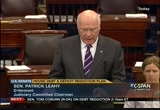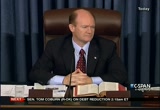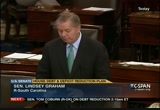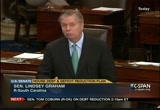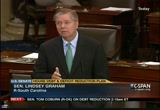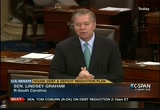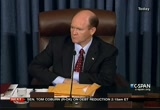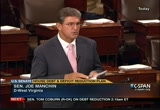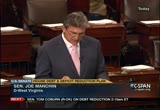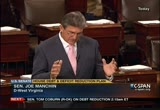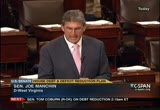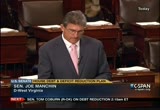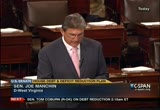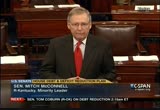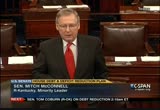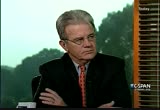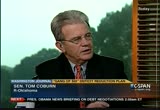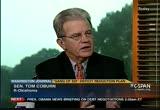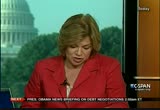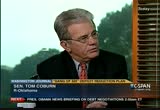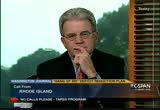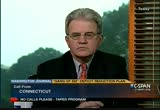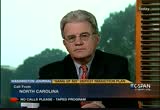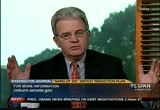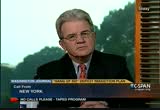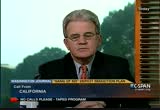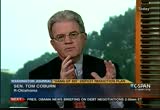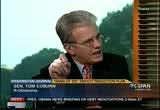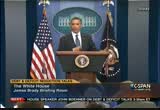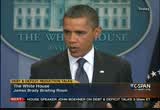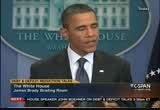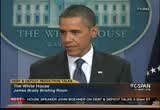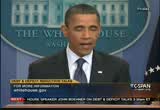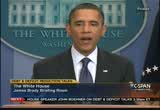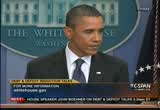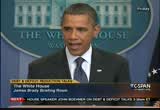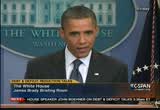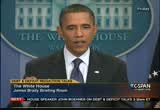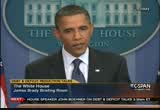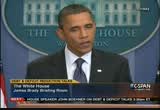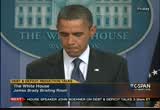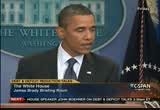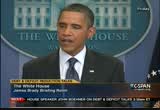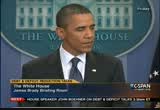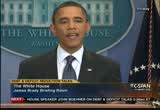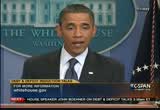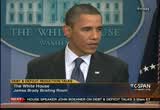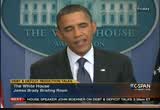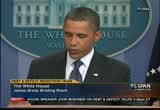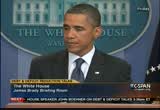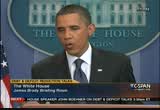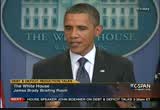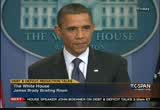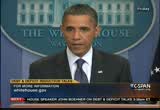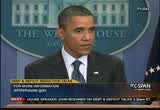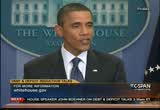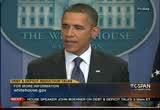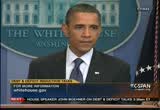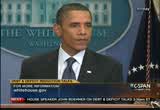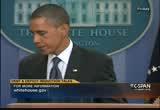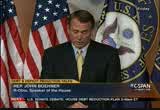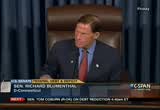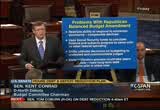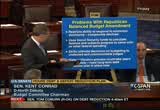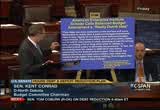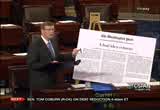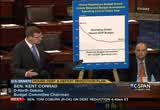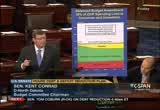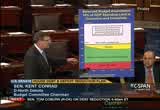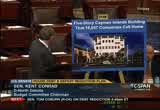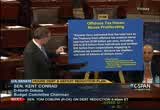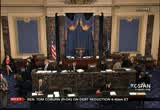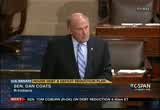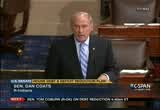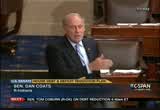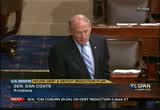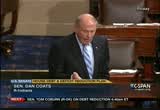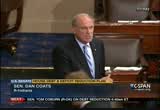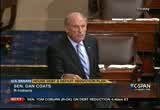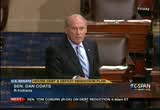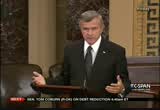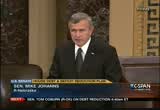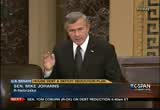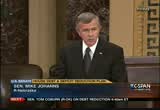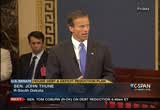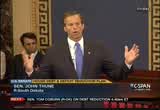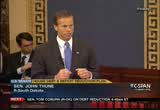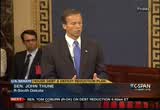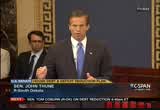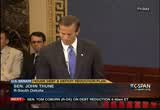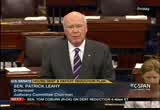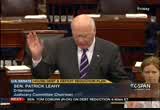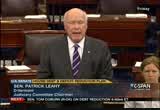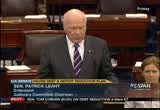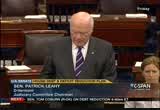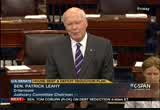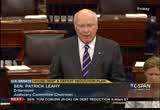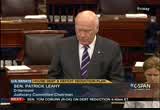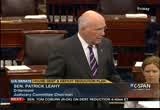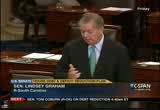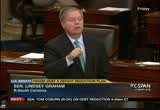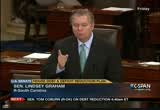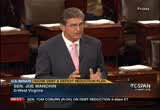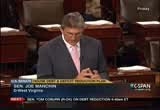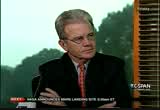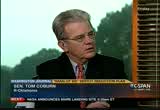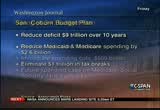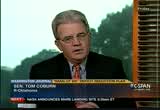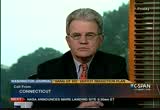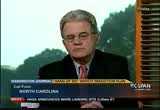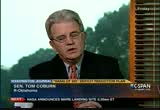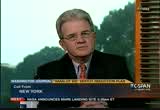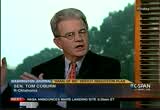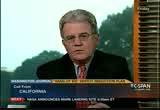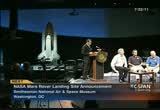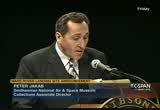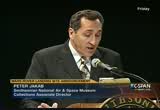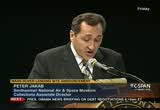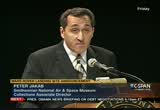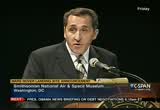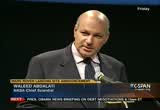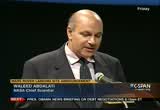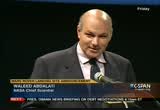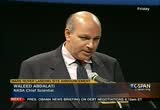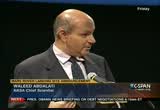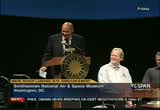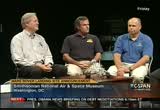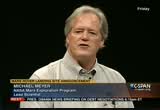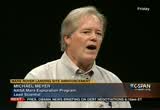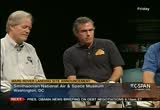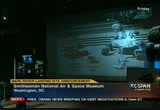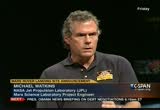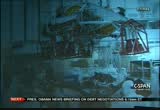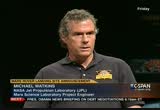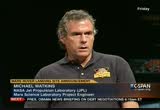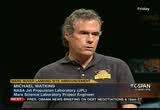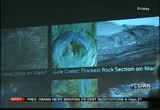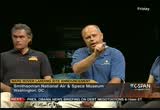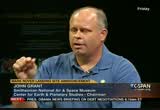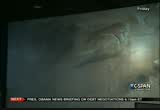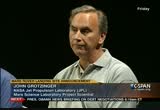tv Today in Washington CSPAN July 23, 2011 2:00am-6:00am EDT
2:00 am
never in our history have we amended the constitution, the work of our founders, impose budgetary restreekses or required supermajorities for passing legislation and now we're saying, let's do it, let's do it on a whim, let's do it without any hearings, let's do it because we can do it. well, all senators swear an oath to support and defend the constitution of the united states. that's our duty and responsibility. the constitution has allowed america to flourish, adapt to new challenges. we have amended it only 17 times since the bill of rights. our constitution deserves protection. i stand with the constitution today. i'm going to support the motion to table this ill-conceived legislation. mr. president, i yield the floor. the presiding officer: the senator from south carolina. mr. graham: how much time is
2:01 am
left on our side? the presiding officer: five minutes. mr. graham: will you let me know when we have four minutes -- four minutes has expired? okay. someone else wants to talk. thank you, mr. president. in 2010 we had a major election in the country. the people who were elected in the house made promises to their constituents that if you sent me to congress i would try to change the system and deal with the fact that our nation is being run into the ground. we've got more debt tha any future generation can ever pay off. 40 cents of every dollar we spend is borrowed money that if you are born today, you inherit about $48,000 of debt that wee spending more on social security payments than we collect in taxes; medicare is underfunded by $30-something trillion over the next 75 years. when you add up all employment programs, we're about $50 trillion short of the promises
2:02 am
we've made. simply put, the house republicans who were elected during their campaigns said that i believe congress is out of control. we're going to become greece and i'd like to do something about t well, what did you expect what they got here? that they'd just say, okay, i've been taught the real way that the congress works and it's all ay? they did something about it. congratulations. anytime a person running for office fulfills the promises they made to their constituents, they've done, i think, a great service to democracy. cut, cap, and balance is a house effort to reduce spending, not ten years from now but this coming year. the problem with all these plans, is h very scere problemso solve our budget problems in the past, gramm-rudman-hollings, between president clinton and the republicans, we achieved balance because we restricted
2:03 am
the growth of entitlements, we restricted the growth of doctor and hospital payments, then we found out how much it was hurting doctors and hospitals. we began to nickle-and-dime doctors and hospitals and guess what? we stopped the program and we spent all of the surpluses. how do you get $14-plus trillion in debt? both parties are working together. this has been a bipartisan effort for about 30 years to run the country in the ground. i like to have a bipartisan effort to save the country from becoming greece and the only way you can do that is put ideas on the table. please to my democratic colleagues, let this debate go forward. if this is not worth debating, what would be? how do you save the country from becoming a debtor nation to the point that the next generation can't inherit the american dream? if you've go a better plan than cut, cap, and balance, please show it to us. we're willing to raise the debt limit but we're not going to do it without change the reason we got in debt venal the cut part reduces spending in 12 20* 12 by
2:04 am
$1 00 billion. that will cause some pain, but it is doable. it is about 3% or 4% of the federal budget. i think most people at home think they can cut their budget 3 oregon 4% to -- 3% or 4% to save their feasm the cap an effort to wipe out the $1.4 trillion deficit. we're going become greece because we're going to have 100% of debt to g.d.p. in the next 20 years and $1-plus trillion deficit has to be changed and you can't do it overnight, but you should be able to do it over ten years. and the centerpiece of the house legislation is a balanced budget amendment to the constitution. what rational person really believes that republicans on this side and democrats on that side are ever going to fin a way to fix our nation's problems without something new happening? the presiding officer: the senator has consumed four minutes. greenhouse gamr. graham: thank . after 40 years, the evidence is
2:05 am
income tax the congress is broken. unless you change the system, fundamentally we're going to run our nation into the ground. so i support a balanced budget amendment. and here's the way it works. you got to get two-thirds in the senate and the house and three-fourths of the states have to ratify the balanced budget amendment. give the people of america a chance to have their say. let pass a balanced budget amendment to the constitution before we take the country and put it in a situation beyond redemption. and the only thing that's ever going to change in body, i'm sad to say, is some discipline imposed by the constution itself. so i promise my colleagues to work with you where i can. but for the rest of my time in the senate -- and i don't know how long it's going to be -- i'm going to push a balanced budget amendment to the constitution because i don't trust the congress to do the hard things on their own. and when i say that i mean republicans, too. i yield.
2:06 am
mr. manchin: mr. president? the presiding officer: the senator from west virginia. mr. manchin: i rise today to speak of one of my greates concerns, which our nation's fiscal future. all of us, democrats and republicans, liberals, mod pratts, conservatives, face a choice about whether we'll seats moment before us -- we'll seize the moment before us or whether we will let this moment passs by. clearly we face tough and difficult decisions. the decision we make as mbers of congress must be the right and responsible ones or our beloved nation and our hardworking families will needlessly suffer. in my state when i became governor, we faced challenging times, growing debts, tough budget choices and when i was first elected in november of 2004, the first thing i did afterwards is going to new york
2:07 am
and talk to the rating agencies to find out what our gravest challenges were. we took those challenges dish went back home and we started making changes much the first thing did i was not blame anybody, any past administration, republican or democrat, or any other body. i was elected to fix things, not to put blame on people. and we started, as west virginians, not as democrats or republicans, about if if i fixe problems of our state. we didn't raise tax rates. people came to me and said, needed to do that. but i couldn't do that without trying to run our state more efficiently. the difference between what we d back home and what's happening here in washington is that we faced these choices together. we worked across party lines in a responsible way to address our fiscal challenges and in doing so we set our state on the right fiscal path, and without -- let me stress again, without sacrificing our moral responsibility or obligations to
2:08 am
our seniors, oureterans, and the people most challenged in our society. and we did that without raising their tax rates. right now, because we made the right choices, our state is doing well. even in the most difficult, challenging "financial times," we've had record surpluses every year, six years in a row. for the last three years we're one of the few states in the nation that's got an increase in our rating from the standard & poor's, moody's and fitch's, the rating agencies. we did all this by living within our means. it is the reason why i'm such a strong supporter of a balanced budget amendment. it makes #u put your priorities based on what our values are in place. i truly believe that most americans support a balanced budget. every family that i know in my state and in this nation works off of some sort of a budt. nearly all of our state governments operate on a balanced budget amendment. i have never seen another place except here at our nation's
2:09 am
capital, at our government in washington, that puts a budget together based on what they want to spend and not on how much they have to spend. but how we balance our budget is critically important. we hav a moral responsibility and an obligation to our seniors, our families, and those who are the most fragile if our challenged society. that is why i cannot support the cut, cap, and balance plan passed in the harks which we will be voting on shortly. as a moderate democrat who is also a proud fiscal conservative, i agree with that bill's goal of a balanced budget. however, i cannot support the naught it takes. the cap cap plan does not reflect who we are or what we want to be os americans. i believe we need to cut but not so deeply without regard for our sarnsdz most vulnerable. i believe we need a cap on our spending but not at a level that could destroy the most important and vil programs that we have in society. i strongly believe that we need
2:10 am
balanced -- a balanced budget amendment, but only one that takes a responsible and reasonable approach. clearly, we can all agree that it is time for us to make the difficult choice that will g our financial house in order, but we must do with the right plan and in a responsible manner that keeps our promises to our seniors, our veterans, and most importantly our children. and like it or not, neither democrats nor republicans can take l this enormous challenge on their own. this is not a political problem. this is an american problem, one that we all face. we should put politics aside and truly put our country first. earlier this week i saw that spirit at its finest on tuesday of this past week, when you, mr. president, along with 49 other of our colleagues, came together to listen to the gang of six who worked so hard based off of the president's fiscal bt commission. demoatsnd republicans -- the presiding officer: the
2:11 am
senate will be in order. mr. manchin: democrats and republicans rolled out the first bipartisan proposal to address the nation's fiscal nightmare. at that meeting senators from both parties evenly split came together to listen to the hard work of the senators who spanned the ideological spectrum. at that moment the gang of six turned into what we affectionately call the mob of 50. and for the first time in these gotiations about our fiscal future, we had a bipartisan plan with momentum that was putting our country first. mr. president, w should not waste this moment. we must work together to cut spending and attack waste, fraud and abuse in every sector of our state and our country. every department, every program that needlessly costs our nation hundreds of billions of dollars every year, we must work together to reform our tax code not to raise tax rates but to make fairness a priority, and it's simply unfair that hardworking middle-class famili in west virginia and
2:12 am
all around this great country would pay more in taxes than a fortune 500 country like g.e. which didn't pay a cent or billionaires like warren buffet -- the presidingfficer: the senator's time -- mr. manchin: democrats and republicans must work together to eliminate loopholes. and it's time to end the three wa that we have on which we're spending so much and the resources we can't afford and the lives we can't spare. mr. present, i say to all this is a time for us to come together as americans, to put our politics aside and dwhat is right for all of the future of this generation and for this country. thank you, i yield the floor. mr. reid: mr. president, i'm going to terminate my remarks very quickly. i want to say to my friend from west virginia, he's been a gat addition to the united states senate. we, of course, know he replaced e great, legendary robert byrd. the people of west virginia should be happy with the
2:13 am
peformance of joe manchin. his executive experience as governor of the state of west virginia which had an impeccable record of surpluses every year he washere. he's brought this talent to washington and has been very helpful to us all. mr. mcconnell: mr. president? the presiding officer: the republican leader. mr. mcconnell: five months ago president obama unveiled the only concrete statement he's made to date on our nation's debt crisis. continue a budget plan so preposterous, so unequal to the moment that it was rejected in the senate by a vote of 97-0. the president's response to this crisis was to pretend it didn't exist. two months later the president doubled down on his vision for a future of debt by demanding that congress raise the debt limit without any cuts to spending or a plan to rein it in. it was a total abdication of leadership, and it wasn't sustainable. so over the past several weeks the president has been doing his best impersonation of a fiscal
2:14 am
moderate. he's talked about balance and left it to others to fill in the blanks. and here's wt democrats in congress have proposed as a solution: more spending and higher taxes as a solution to a debt crisis. just yesterday with the clock ticking, we heard reports of a volcanic eruption among democrats that we shouldolve this crisis by focusing on reducing washington spending. well, mr. president, the solution to this crisis is not complicated. if you're spending more money than youe taking in, you need to spend less money. this isn't rocket science. we could solve this problem this morning if democrats would let us vote on cut, cap, and balance and join us in backing this legislation that republicans support. but the first step in solving a problem is to admit you have one, and too many democrats refuse to admit that washington has a spending problem.
2:15 am
that's why republicans have insisted that we focus on spending in this debate. the reason we've got a $14 trillion debt is because no matter how much money washington has, it always spends more. and the only twaoeu cure the problem -- and the only way to cure the problem is to stop enabling it. americans get it. i want to thank every american who has spoken out in favor of cut, cap, and balance. today the american people will know where we stand. a vote to table this bill is a vote to ignore this crisis eve longer. a vote to get on this bill is a vote for getting our house in order. so i would urge my democratic colleagues one more time to reconsid their position, join us in support of a future we can afford. mr. president, i yield the floor. mr. reid: mr. president? the presiding officer: the majority leader. mr. reid: i say to my, all my friends, the new senators, welcome to the united states senate. this is a vote on the piece of
2:16 am
legislation that was described by my friend, the chairman of the judiciary committee, about as well as anyone else. it is violative of our constitution. and this is a vote on this matter. and wee going to dispose of this legislation as it needs to be so president obama and the speaker can move forward on a matter that will have some revenue in it and send it over here and we can m >> and now a discussion on the deficit talks with oklahoma senator tom coburn. a member of the gang of six. from "washington journal", this is 30 minutes. [captioning performed by national captioning institute] [captions copyright national cable satellite corp. 2011] he's joined the so-called gang of six in the senate which he left earlier, and also announced a $9 trillion debt scheme atic.
2:17 am
we'll be talking about this and more. senator, headlines suggest that if there is a deal being crafted between the speaker and the between the speaker and the senate that your democratic colleagues in the senate are angry about being excluded from it. people are watching this mere yad of discussions. how do people understand where things are right now? guest: i don't really understand where they are. if they have negotiated something they agreed to, why would they complain? it is the whole washington silliness of complaining because you don't know what's going on. nobody knows what's going on except the principals in the room, and when they come to something they file feel they can build a case for on both sides, they will put it out there. i was a part of the gang of six
2:18 am
discussion. the idea is to get us moving. they should be listening. maybe they need to offer something themselves. that's been the problem. we haven't had any offers. we have seen the republicans offering multiple things. we have a bill on the senate they are going to table that actually fixes the problem, raises the debt limit, and they don't want to vote on it, so we're going to table it. so i think it is all political posturing. host: you know frequently this town works to the brink. is there anything different about this time? do you think a deal will be done? guest: i certainly hope so. the root for us, as every american, is if we don't get a deal done, i think it will cost us a half of one percent.
2:19 am
even if we got a deal done 10 days later, i think it costs us a half of one percent. that's $75 billion a year in terms of the damage to our credit. increased interest cost. i think another thing we need to do -- you have to ask what the problem is. the problem isn't the negotiation between the republicans and democrats, it is not between the president and the speaker. the problem is for us to maintain our debt rating we have to have a program that cuts about $4 trillion at a minimum about $4 trillion at a minimum over the next 10 years. every interest interest grurengs i was listening to your calls beforehand. every interest group says they don't want to get touched. the fact is every interest group will be get touched. everybody that's comfortable with their benefit is going to be a little less comfortable if we're all as a country going to get out of this. host: we had a number of callers
2:20 am
saying congress should cut its own salary. i have a washington post article saying coburn should leave by example. what are you offering? >> cut our salary by 15%. actually, there wouldn't be anything wrong with cutting our salaries until we decrease the budget deficit. cut our expepses back 15%. we cut them back 5% this yeamplet in other words make us have to do some of the hard -- i mean, our budgets are ludicrous. i trim back $600,000 every year. >> you are allocated money -- >> that i don't need. what you have to ask is, if i can do that, can't everybody? that's 20% of my budget.
2:21 am
host: your 900 trillion plan, where is it going to go? >> it ising going to go anywhere now. no one is looking at it. this is the first time they have researched what gao has said what the congressional research has said, what the individual inspector generals have said, what o.m.b. has said, plus we what o.m.b. has said, plus we have done our own research and said, gosh, given all these facts, common sense would say you do this. so there are 3,000 references in there to studies on our recommendations that we've made. and so i hope it becomes a place where people go to find out information about what we can cut. we could have done more. england just recently said you could recently cut 14% out of the pentagon. his assessment is that you could cut 14% of the civilian payroll
2:22 am
out of the peg -- pentagon. that's $150 million over 10 years. that's a lot of money. host: what do you say about this being a naive cut? guest: washington doesn't cut because washington cares more about being re-elected than they do about the public. it comes from a lack of courage to stand up and do the best right thing for our country. when you are threw up -- through up here and you get out and the country is belly up r. you say, well i believe careerism is killing us. term limits and a balanced budget amendment, term limits and a balanced budget amendment
2:23 am
would fix everything that's wrong with washington. wrong with washington. host: you answer this twitter questioner, which says, "would you vote for the house balanced budget in a recession?" guest: yes, because it will take a period of time for that to move through the states. we have to be careful how fast we cut, but we need to cut and we need to cut quickly. otherwise we're between two lanes. if we don't cut quickly enough, we're going to have the amount we cut in offset with increased interest costs. if we cut too fast, i mean, we can cut fast, but if we cut too fast, we'll have a negative impact on our economic growth. so we have to go down that line. that's why $4 trillion is a minimum. host: in the wall street journal this morning, his name is peter
2:24 am
shelkin, he is a co-editor of understanding america, the anatomy of an exceptional nation. second year at law school. he one paragraph. "i can think of no other law that would alo judges to exercise more budget-making decision than a balanceed budget amendment. even if the courts simply did their job and did not grasp for that power." guest: we have a judge sitting on the bench today that should be impeached. the fact is you will never control washington with today's politicians until you put a bridle and a bit in their mouth that says you can't spend money you don't have. it won't hatch l happen. -- it won't happen.
2:25 am
host: one more column. grover nor quift has a piece where he is explaining his position on taxes. "read my lips, no new taxes. why republicans should not relent." he was on our program and talking about you specifically. we want to replay that quote. >> the difference of opinions between coburn and americans for tax reform, between coburn and the 225 members that signed the pledge is we are for tax reform but not for tax increases, and coburn vote forward a $2 trillion tax increase when he endorsed obama's deficit plan. all three members of the republicans in the gang of six not only took the pledge not to raise taxes but then wrote me a letter saying, look, we are not going to raise taxes.
2:26 am
we just want economic growth. i'm for that. coburn has publicly said in the past that he likes tax increases. that passed him by. the republican leadership in the house made it clear that if coburn continues to be for tax increases, he's on his lonesome on that and no one else has joined him. host: senator coburn? guest: i think he represents the silliness of our political system today. i don't want to raise taxes. i think it is terrible that we would have to raise more taxes. but if we're going to get in agreement in washington to fix our problems when those of us don't want to raise taxes control the house of representatives, don't control the senate, don't control the white house, it is pretty stupid and naive to think you are going to win that battle. i would rather fix our country
2:27 am
and lose a battle with grover norquist then send our country norquist then send our country down the tubes and raise a point of view that is suicide. the fact is, in is a lot of way to enhance the federal government. reforming the tax code is a great way to do it. we have to get $4 trillion. that doesn't go away no matter what anybody says. the president didn't have a deficit plan. the president's commission had a deficit plan. he never enbraced it. you see the games played with the numbers, which aren't accurate. realistic things. plus, revenues are at the lowest point. we're at 15.8%. revenues are as a percentage of g.d.p. i think there are tons of tax credits and things in the tax credits and things in the tax codes that are unfair that we ought to eliminate. anybody that gets something out of the tax code today in terms
2:28 am
of the tax credit and the tax spend tour, you are paying for it if you didn't get one. it is a matter of shifting costs around. if you don't have a special deal on the tax code that you can take advantage of, you can actually pay more taxes. host: here is part of the plan, reduce the deficit $9 trillion over 10 years. reduce medicaid and medicare spending by $2.6 billion. eliminate $1 trillion in tax breaks. that is part of senator coburn's plan. the "gang of six "budget's plan is to reduce the deficit $4
2:29 am
trillion over 10 years, overhaul the tax code $1 trillion, immediate spending cuts of $500 billion. caller: i appreciate what you are saying, but i think the whole problem of everything that we're going through in this country right now has to come down to one simple thing. and that is separate ralte racial of powers. now, a lot of people get this miscon trude with oh, you mean separation of church and state. no. well, yes and no. in their derrick the church was the big power. kings and queens could not move without the permission of the church. nowadays it is big business. when you have big business influence washington, d.c., people like yourself, this is what you are going to get. you cannot have foxes guarding the hen house.
2:30 am
host: all right. your response. guest: if you talk about specific tax credits, i think he's right. i don't think it is just big business. i think it is the aarp, i think it is the big labor unions. i think it is everybody. the whole fact is the federal the whole fact is the federal government is too big and it is in areas it shouldn't be. if you read the constitution, you also read the enumerated powers which gives limited powers to the federal government and specifically states everything not listed here is reserved for the people in the states. the reason we have a $3.6 trillion, $3.7 trillion budget, is a trillion and a half of that or more is stuff that's not our responsibility in the first place. sho look, i'm one of the few republicans that stands up and says i think we need to eliminate some of these tax loopholes, but i think we need to do it in a way that doesn't
2:31 am
grow the government. host: here's a comment from kevin mccarthy. he writes "projected entitle ments are between 25 and 50 billion. why are we not more focused on cutting this spending instead by fixing the current epidemic of illegal immigrants in the u.s.?" guest: that's a good question. we are at the point where there ought to be nothing that we are not doing. we ought to be looking at everything. this spring i spent three days all across arizona where the vast majority of our problems are. that is not an unfixable problem. the problem is, we're not getting straight answers from the department of homeland security. we're not completing what we know will work. we're not training new border
2:32 am
patrol agents to be as effective as they can because they don't have the language skills. we put them out there without the language skills. they are right. the senate hasn't done anything this year because the leader of the senate doesn't want to take his votes. his votes. there's an election coming up in 18 months. that's crazy. we haven't had a budget in 2 1/2 years. the reason we haven't had a budget is they don't want their member to cast a vote that might be cast in a way that might hurt them in election.
2:33 am
2:34 am
20%, 19% -- would be 16%, 20% and 19% -- that would be what you mail in th. t came out with this number, people would be aware if the government was going to cost them more money or less money each year. i thought that was a reasonable way to approach this. i would be interested in your answer off the air. thank you. guest: you're welcome. it is a novel idea. i'm not sure i want the government to tell us what the tax rate would be every year, but it certainly would get us even gauged. you are talking about a modified flat tax for everybody. i think we ought to go on and do the national sales tax where --
2:35 am
host: in lieu of income tax? guest: yes. it is embedded into our income tax system and the products we export in this country and make us super competitive around the world, it would re-enhance manufacturing in this country, because it would offset, the taxes would be taken out of the products that we produce. it would be a great way for us to actually grow our economy. it is simple. people say they barter. we have $300 billion a year. people don't report income taxes. everybody would know what it costs.
2:36 am
if you delegate to the states, it will be done more efficiently it will be done more efficiently and economically. host: an example? guest: education. we have spent $2.6 trillion since the department of education has been open. we have bureaucrats in washington telling teachers and administrators in oklahoma how to take care of kids, what to do for kids who have no concern whatsoever on them, and when you look at the metrics, susan, of the success of our educational system, there is not one parameter that's better. so why not take that money and just send it to the states and just send it to the states and let the states do what they do better than what we do.
2:37 am
what we have done, we have lost our educational advantage, and it needs to be returned to the states. we can do that in the $9 april april. host: there is a question, if it host: there is a question, if it is that promising, senator co burn, why isn't there a bill? guest: there is a bill. they won't let it get to the floor. caller: i watch you on the senate floor all the time. senate floor all the time. i wish you would consider running for president. we need you. you are probably one of the most honest men in our government.
2:38 am
i wish you could consider one suggestion. i would like to see a bill past that there wouldn't be any campaigning until -- you couldn't possibly raise the money with us, and that would make it a lot better for our election system. thank you so much and please consider, please consider running. we would all vote for you. thank you.
2:39 am
guest: the presidential race is 16, 18 months away. it is causing us not to focus on the problems at hand, and we are seeing people make decisions based on a re-election 16, 17 months from now. that's why i believe in term limits. i believe if we had term limits for the members of congress, you wouldn't see as much foolishness. people wouldn't be trying to gain advantage partisan wise. they are -- we have seen a difference in how things work. the angst would be less.
2:40 am
people would be coming here to get something done before they come home. host: the next caller is from san antonio. this is mike. you are on for the senator. . caller: i would like to make a suggestion that your viewers could go to the irs website and finds that from the taxes in 2008, and they can taste those tables right into excel -- paste those tables right into the ex cel, and do the math themselves. it is peanuts. the only way we are going to get to where we need to be is to cut spending.
2:41 am
guest: yeah. that's a great point. in 2008, the top 20% in this country paid 84% of all of the taxes -- paid 84% of all the taxes. if you raise taxes, what you see is tax avoidance starts happening. what we know historically is the government can get around 18.8%, 18.9%, maybe 19.5% as we did in 2001, close to 20%, but people start changing their behavior to lower back -- that. gorman is twice the size it was 10 years ago -- twice -- the government is twice the size it was 10 years ago. the government would still be 63% bigger than it was in 2001. you cut $9 trillion and it is
2:42 am
still 63% bigger than it was in 2001. that is a 3.5% annualized growth in the the size of the covenant -- government. we cannot afford that inefficiency. host: the next call comes from williamsville, new york. caller: good morning. it is nice to be on with you. i have sent in an e-mail. i wonder if you could pull that up. it has an answer key. senator coburn, i would like to thank you for taking on grover norquist. i think there is something treasonist about making someone take a pledge above and beyond what they take in the oath of office. my concern is, while i believe we have a spending problem, we also have a revenue problem. that comes from an understanding of who owes whom what.
2:43 am
the operating budget owns trust funds to, for example, the social security trust fund, $2.6 trillion. some people say, well, that's an illusion. but the funds collected were not an illusion. it only became an i illusion when it was put into the unified budget and was moved to pay for expenses. so if tax funds are an illusion, congress is the ma jigs. we need to repay that money. that is it why there is a revenue issue. while i think there is spending cuts, i do think an honest budget which will require you all to destroy the unified all to destroy the unified budget and then require individual balanced budgets for the operating budget, for the trust fund, but only after the operating budget has returned the i.o.u.'s to social security and to medicare.
2:44 am
i believe there are 110 of those trust funds. smaller ones that are paid for by fees. please destroy the unified budget. thank you very much. and thank you for what you are doing. i think you are honorable. i just disagree with the way you are doing it. guest: i think she's dead on. there are 120 trust funds we've stolen the money from and spent somewhere else. you hear social security doesn't need to be reformed. the reason it needs to be reformed is because it isn't sustainable. we can't ever borrow the money in the markets because congress has stolen that money and spent it. we have to borrow against it. what we have to do is reform it so we have to borrow from those
2:45 am
and make it sustainable. i think she is right. they use it to run that money. so she didn't have a tax increase for it. ever since, we have been dishonest about the american people about the true cost of things and implied that we can afford to do things that we really can't. host: what are the main areas that contributed to the government. guest: every year the federal government has grown, the defense department, it is out of control. in terms of its purchasing of weapons systems. no one is spending money and how. there is a gray area of
2:46 am
generalized government in all sorts of government. just wait. it is going to be about 45% of anybody that has real health insurance through their employer. we can find each agency and how it has grown. nasa, even though we don't have a manned space flight going on now after the shuttle without going through the russians, yet their -- not on getting anyone into space. i would make this point, susan.
2:47 am
we -- host: there is an extreme spending gap between the wealthy earnings and the stale wages of everyone else. guest: what are you going to do? right now, do you want the country to grow? we would tax those people that have the capital that are going to create the jobs in this country and give it to the government rather than decrease government spending and allow that money that they were going to tax to go into productive jobs? the reason you have $3 trillion
2:48 am
sitting on the sidelines in businesses not being -- if you take all this money, we would still have about a $700 billion. let's take everybody's money, all of it that makes $250,000. that doesn't solve our problem. it doesn't come close to solving our problem. it is a pipe dream. we have to be careful. the thing that built this country is the hope that people can get ahead, that can make it to a plateau. if you start saying, we're going to punish you for going there, there is not going to be jobs created, and we will continue to export all our jobs. host: next caller is tiffany, republican in rancho, coucamunga, california. caller: i just wanted to say
2:49 am
that i support some of your ideals, however as a middle class person, it is difficult for me to support you as far as your tax increases not being the 35 or 39% that they are supposed to because everybody else is hurting. i look at my budget, and i say, i really can't afford to give anymore. my salary is not in -- increasing. if your plan keeps your belly fat and i'm starving over here. i think we need to do a little something a little more balanced. thank you for taking my call.
2:50 am
guest:: we need to lower rates ultimately to we get more money invested in the economy, and that will be $150 billion in revenue to the federal government and economic growth. when i say to you that the government is twice the size it was 10 years ago, you have to ask a question, is the problem revenue or is the problem been able to get out of control? the government has no business being in the business it is in. we have 180 programs for economic development that comes to the economic development of the states.
2:51 am
there is area upon area where our hearts are big, great intentions, but the fact is, the right hand doesn't know what the left hand is doing. the very mistake would be, if we don't cut the $7 trillion or $8 trillion in my plan and you don't raise taxes, we are toast. we won't ever reverse it. we have more of a means testing on the upper hand. as you increase the taxes on social security, social security benefits. they have to pay them back out.
2:52 am
we totally revamp the disability program. we're in the midst -- the senate we're in the midst -- the senate committee is totally investigating the i.r.s. on their disability program. whether it is a judge that had a 99% approval rating but did 72% of cases for two lawyers in virginia. that's going on across the country. social security administration is part of disability. 1-18 people in this country is collecting a disability check. i can tell you that 1-18 people in this country are not disabled. i can give you personal experiences.
2:53 am
people have to look around. what happened to them? the law says if there is any job you can do in the economy, you are not disabled. yet we have had a system, the sts social security -- the social security system implies you are disabled and we have to prove you are not. it needs to be the other way. we have undermined self-reliance in this country. in this country. now we hear people who can't do it. we can't because i'm not -- we have families with 14 members that are collecting social security checks on each? i mean, it is out of control. if someone is truly disabled, i want to make sure we're here to help them. but i am planning on coming at you if you are stealing from the system. .
2:54 am
i would like to remind people how intelligent our founding fathers were, because they set up a republic. they knew that people would start taking goodies out of the treasury. here is a tax that the tea party could get behind, the put your money where your mouth is tax. everyone who has voted for increased government -- people who have voted to give our tax dollars to foreign countries so that they can use it to kill our soldiers -- people who are behind saddling us with all of these illegal aliens across billions of dollars each year -- people like george soros -- host: could you get to your point?
2:55 am
caller: we need to tax those who earn over $250,000 per year. guest: we implementation -- the implementation, the practicality of it -- it would not work. it is supposed to be limited government. we have created the fastest- growing, the greatest wealth -- acquiring nation the world has ever seen -- wealth-acquiring nation the world has ever seen.
2:56 am
we still have the same american spirit. it is there. we have been stifled because the government is smothering us. we need to un-smother. host: we will stay tuned. the debates and discussions continue about the debt at the august 2 deadline moves closer. thank you. >> tomorrow on "washington journal" -- manu raju as the latest on the ongoing debt talks. douglas holtz-eakin talks about his recent study which would require drug companies to issue rebates -- and meredith mcgehee
2:57 am
that the history of presidential campaign financing -- who is eligible and how taxpayers -- axpayers pay. >> house speaker john boehner has announced he is pulling out of the ongoing debt and deficit reduction talks with president obama. instead, the speaker said he will negotiate with the senate leaders. washington is less than two weeks away from the deadline to raise the federal borrowing limit. after that, president obama met with reporters. this is just under 30 minutes.
2:58 am
>> good evening, everybody. i want to give you an update on the debt negotiations. speaker boehner says he will walk away from the negotiations we have been engaged in for the big deficit-reduction and debt- reduction package. i thought it would be useful for me to give you some insight into where we were and why i think that we should have moved forward with a big deal. essentially, what we had offered speaker boehner was over $1 trillion in cuts to discretionary spending, both domestic and defense. we then offered an additional $650 billion in cuts to
2:59 am
entitlement programs -- medicare, medicaid, social security. we believed it was possible to shape those in the way that preserves the integrity of the system, made them available for the next generation, and did not affect current beneficiaries in an adverse way. in addition, what we sought was revenues that were actually less than what the gang of six signed off on. you had a bipartisan group of senators, including republicans who are in leadership in the senate, calling for what effectively was about $2 trillion above the republican base line -- baseline that they have been working off of. we said it was $1.20 trillion in additional revenues -- give us $1.20 trillion in additional
3:00 am
revenues, which could be accomplished by eliminating some deductions and engaging in a tax-reform process that could lower rates generally while broadening the base. let me reiterate what we were offering. we were offering a deal that called for as much discretionary savings as the gang of six. we were calling for taxes that were less than the gang of six -- what the gang of six had proposed. we were calling for modifications to entitlement programs, which would have saved as much over the 10-year window. in other words, this was an extraordinarily fair deal.
3:40 am
sandra wilkness be granted floor privileges during the consideration of the bill. the presiding officer: without objection. mr. reid: in about an hour we'll vote on the so-called cut, cap, and balance legislation. as i said before, in fact just a few minutes ago, this is one of the worst pieces of legislation to ever be placed on the floor of the united states senate. it violates the spirit of our constitution and certainly what we're trying to accomplish here in washington. and we as a senate refuse to waste even one more day on this piece of legislation. we have 11 days left until the united states simply stops paying its bills. and, frankly, we've wasted too
3:41 am
much time already on this. the united states house of representatives needs to know this legislation has expired. it's gone. republicans wanted to vote on their radical plan to kill medicare and social security before they would consider helping democrats avert this crisis n. an hour they'll get this chance. at least one republican senator went toefr a large gathering in the house of representatives, i'm told, and said we're going to get at least 60 votes on this. please, mr. president, their extreme plan would within 25 years cut in half every federal benefit on the books including social security, medicare, medicaid, military pay, veterans benefits and much more. meanwhile it would erect constitutional amendments for special interests, the millionaires and billionaires who are able to buy those yachts and corporate jets for which they get tax benefits.
3:42 am
republicans demand we pass this radical proposal before they even consider cooperating with democrats to avert a crisis that would rock the globe. they are demanding the death of medicare and social security as its ransom. we all know their failed prescription will fail here in the united states senate. they do not have the votes to pass a plan that would pwalt budget on the -- balance the budget on the backs of seniors and middle-class families. and so we must move on, mr. president. i want to be very, very clear. there is simply no more time to waste debating and voting on measures that have no hopes of becoming law. we have no more time to waste playing partisan games. as the saying goes, indecision becomes decision with time. our time is running out before this gridlock, this refusal by
3:43 am
the other side to move an inch toward compromise becomes a decision to default on our debt. the markets are already reacting to our inaction. ever responsible voice, including those of my republican colleagues, many of them at least, warned much worse is to come if we don't take action and take it soon. that's a risk we can't afford to take. i ask my republican colleagues again to join democrats in seeking common ground. the american people have demanded it of us. overwhelmingly they have said the national default is a serious problem and that is an understatement and both parties of congress must meet in the middle. we all know, mr. president, there are talks going on between president obama and speaker boehner. i wish them well. we await their efforts. i'm told there will be revenue measures in that. if that's the case, we know constitutionally the matter must start in the house of representatives. i say to both the president and
3:44 am
to the speaker here on the senate floor, representing my democrats, and i'm confident many republicans, be very careful. show a lot of caution as this negotiation goes forward because any arrangement must be fair to all america, not just the wealthy. would the chair announce proceedings for this morning. the presiding officer: under the previous order, the leadership time is reserved. under the previous order, the senate will resume consideration of the motion to proceed to h.r. 2560, which the clerk will report. the clerk: motion to proceed to the consideration of h.r. 2560, an act to cut, cap, and balance the federal budget. the presiding officer: under the previous order, the time until 10:00 a.m. shall be equally divided between the two leaders or their designees.
3:45 am
the senator from north dakota. mr. conrad: mr. president, in about an hour we are going to vote on a package that was sent this body by the house of representatives. let me first comment on the context within which we consider this legislation. i think it's very important to remind our colleagues and remind citizens across the country who are perhaps watching and listening that our country is borrowing more than 40 cents of every dollar that we spend. that is unsustainable. it cannot be continued for long. mr. president, i think all of us know that the circumstance that we are in is extraordinarily serious. here's what the chairman of the joint chiefs of staff told us just a year ago. our national debt is our biggest national security threat.
3:46 am
mr. president, i believe that that's the case. our gross debt now is approaching 100% of the gross domestic product of the united states. we've not seen a debt that high since after world war ii. mr. president, it is extraordinarily important that we take on this debt threat. it is extraordinarily important for our country's future economic well-being that we change course. mr. president, the legislation that has been sent to us by the house is one of the most ill considered, ill-conceived, internally inconsistent pieces of legislation that i have seen in my 25 years here in the united states senate. it has all the earmarks of something that was hastily thrown together, really pieced it together. and this legislation includes an
3:47 am
amendment to the constitution of the united states. mr. president, we are better than this. the congress is better than this. certainly the country is better than this. let me just be brief. the fundamental problems with the balanced budget amendment are as follows: one, it restricts the ability to respond to economic downturns, having all the potential to make an economic downturn even more serious. it uses social security funds to calculate balance and subjects that important program to the same cuts as other federal spending, even know it is funded separately. mr. president, it shifts the ultimate decisions on budgeting in this country to unelected judges and unaccountable judges. finally, it provides for state
3:48 am
ratification process that could take years to complete. we need a long-term debt resolution now, not in the sweet by-and-by. mr. president, the proposal before us has all of the potential to turn a recession into a depression. why do i say that? because, mr. president, it would prevent congress from taking urgent action to provide lift to the economy in the midst of a severe economic downturn. here's what norman ornstein, a distinguished scholar at the american enterprise institute said about it, "few ideas are more is he ductive on the -- stkubgtive on the service than a balanced budget amendment to the constitution. nearly all of our states have budget requires. when the economy slows states
3:49 am
are forced to slash spending at just the wrong time, providing a fiscal drag when what is needed it countercyclical policy to stimulate the economy. the fiscal drag from the states in 2009 and 2010 was barely countered by the federal stimulus plan. that meant the federal stimulus provided was nowhere near what was needed but far better than doing nothing. now imagine that scenario with a federal drag instead. mr. president, "the washington post" editorialized, worse yet, the latest version of the balanced budget amendment would impose an absolute cap on spending as a share of the economy. it would prevent federal expenditures from exceeding 18% of the gross domestic product in any year. most unfortunately, the amendment lacks a clause letting the government exceed that limit to strengthen a struggling economy. mr. president, that has all of
3:50 am
the potential to turn a recession into a depression. two of this country's most distinguished economists: alan blinder, former vice chairman of the federal reserve; and mark zandi former consultant advisor to this senator mccain evaluated the response to the last downturn. their conclusion: absent that federal response, we would have had great depression 2.0. mr. president, the legislation before us would have prevented that federal response. they call this legislation cut, cap, and balance. they misnamed it. they should have called it cut, cap, and kill medicare. because that's precisely what it would do. mr. president, why do i say that? because when i referred earlier to the internal -- inconsistency of this legislation, this is
3:51 am
what i was referring to: they have two different spending caps in the lilings befor in the us. in one part of the legislation, they say the spending cap would take spendin spending from 24.1f g.d.p. to 19.9%. that's in one part of the bill before us. in another part of the bill -- constitutional amendment -- they say, the spending cap would be 18% of g.d.p. so i don't know who cooked this up, but you'd think they'd have at least gotten on the same page as to what is the limitation on spending. what does it mean if you have a balanced budget amendment with a cap of 18% of g.d.p.? well, mr. president, here's what it means. and, by the way, the constitutional provision would
3:52 am
certainly trump the conflicting provision that's in this legislation. so the cap would not be 19% of g.d.p. the cap would b would not be 19. what would it be? it would be 18% of g.d.p. if you fund just social security, defense, and other nonhealth spending and interest on the debt, you're at 18% of g.d.p. there's not a dime left for medicare. there's not a dime left for medicaid. is that really what they intended? it must be, because that's what it says. so medicare is finished. medicaid is finished. anybody that votes for this
3:53 am
better understand what they're voting to do. mr. president, here is a former top economic advisor to president reagan. here's what he said about the amendment that is before us: "in short, this is quite possibly the stupidest constitutional amendment i think i have ever seen. it looks like it was drafted by a couple of interns on the back of a napkin. every senator cosponsoring this legislation should be ashamed of themselves." mr. president, that's a former top economic advisor to ronald reagan. i've been here 25 years. i don't think i have ever seen a piece of legislation more unprofessionally constructed than the legislation before us.
3:54 am
but those aren't the only problems. when they said -- they titled this "cut, cap, and balance," they could have also called it preserve, protect, and defend tax havens and tax shelters, because that's the other consequence of this legislation. why do i say that? because it would take a two-thirds vote to increase revenue -- two-thirds vote. that means attempts to shut down these offshore tax havens, these abusive tax shelters, because they'd rave revenue, would take a two-thirds vote. now, what does that mean? well, here's a little building down in the cayman islands i've talked about many times, a little five-story building, claims to be home to 18,857 companies. they all claim they're doing business out of this little building. i have sea aid this is the most efficient -- i've said this is the most efficient building in the world. quite remarkable.
3:55 am
18,857 companies are doing the business out of this little five-story building. and i'm told there are not many people coming and going from this building during the day. are 18,000 companies really doing their business -- they call this headquarters. that really their headquarters? we all know it's not their headquarters. we all know what's going on. it's not business. it's monkey business. what they're doing down there is avoiding the taxes that all the rest of us pay. and this amendment would protect this scheme. you want to protect this scheme, vote for this amendment. mr. president, how big is this scheme? well, here's what our own permanent subcommittee on investigations has told us: "experts have estimated that the total loss to the treasury from offshore tax evasion alone
3:56 am
approaches $100 billion per year, including $40 billion to $70 billion from individuals and another $30 billion from corporations engaging in offshore tax evasion. abusive tax shelters add tens of billions of dollars more." mr. president, you want to lock in these abuses? you prefer to pay more in taxes yourself so that people can engage in these scams? vote for this amendment. vote for the legislation that's before us. vote for what is on the floor because you'll protect them forever more. mr. president, i end as i began. this is perhaps the most ill-conceived, ill-considered, internally inconsistent legislation that i have ever seen in my 25 years in the united states senate. i hope my colleagues have the wisdom to vote "no." i thank the chair and yield the floor. the presiding officer: the
3:57 am
senator indiana. mr. coats: mr. president, i just would like t the chamber to know that today marks the 88th birthday of one of the great members of this senate body, a true american hero, former majority leader bob dole. and as i reflect on the extraordinary life he has led -- and i had the privilege of serving under him as a united states senator and working with him in the private sector getting to know he and his wife well -- i cannot help but note that the leadership that he provided in comparison to the lack of leadership that is being provided in this body now stands in great contrast. there is an absence of leadership here and a seriousness of purpose that bob dole would never have allowed, had he been majority leader. i say that because i come to the floor today greatly troubled by the remarks that were made here in this senate yesterday and
3:58 am
again this morning by the majority leader regarding the bill that is before us. the issue here takes two tracks. one of which is the content of the amendment in the bill that is before us that was voted on by the house of representatives, passed by the house of representatives, and sent over for us to debate and pass here. we can disagree -- and i think there's been some misrepresentation of what this bill actually does. we can disagree about the contents of it, but we have an obligation and a responsibility to debate those contents and to put every member of this body on a position of saying "yea" or "nay" on amendments that might be offered to improve it or to dhaing ichange it or to modify d
3:59 am
finally whether or not to support it or not support t that is vote on a motion to table. you know, thraw there are a couf definitions of "table. " more than a couple. but one of those is tabling -- getting to the table to negotiate something, just as the nfl players and owners are doing much more seriously and with much more consequences to the future of this country, what we ought to be doing. putting it on the table, debating it, and addressing it, expressing your support or nonsupport, defending it, characterizing, mischaracterizations -- that's what this body is about. it is the world's greatest deliberative body is deciding not to deliberate this bill at all. the second definition of "table" is taking it off the table so the majority leader has said, i'm not going to allow you to debate it. i'm not going to allow amendments. i'm not going to allow up-or-down votes so the american people know where we are.
4:00 am
this is a vote to table so we don't even have the opportunity to debate it. now, it was the majority leader himself who said we're going to be in session every day until we get this thing settlemen settle. now he comes down here and says, i am neat going to waste one more day on this. senators who were told we're going to be here every day, we'll be here on so saturday, ad now says we can go home. what kind of leadership that? we don't know whether we're supposed to be here or not supposed to be here? what's happening with one of the most serious crises that we're facing, the country that is ever seen, particularly in the financial area, it is "the" most serious, except for maybe the great depression. and we're told, we don't even have time to debate this, this is a waste of time. i quote the unbelievable
4:01 am
statements that have been made by the majority leader. this piece of legislation is about as weak and senseless as anything that is ever come on this senate floor? really? i could spend a half an hour talking about senseless legislation, egregious legislation, discriminatory legislation that is ham com haso this floor and debated and not just tabled. to characterize the serious efforts of the members of the house of representatives and the members of the senate, including some democrat members, of trying to fix this problem, to characterize that as senseless and wasteless, i'm not going to send one more day of time on this senseless legislation. i thought, on reflection, the majority leader would come here this morning and say, perhaps i overstated the problem. let me better explain where i think we are and where we need to go. but, no, he comes down and he doubles down this morning, doubles down and says, it's
4:02 am
very, very bad piece of legislation, without merit, it gets in the way, gets in the way. talking about dealing with cutting spending that we know we can't afford, talk about putting some caps on it so we don't keep doing this in the future, so we have a path to fiscal responsibility, talking about a balanced budget so we live within our means? that's getting in the way? this body has failed its responsibility to be faithful to the constitution and faithful to the people of america. and, as a consequence of that, we're signature here saying, we're not even -- we're sitting here saying we're not even going to debate something that is brought forward with hundreds of thousands of hours of effort. maybe you don't like t maybe you don't agree with it. we will, stand up and say so -- well, stand up and say so and tell us what you want to do about it. the majority leader and his party has not brought one piece
4:03 am
of legislation to this floor. the president has not offered one number, one proposal in writing that we can work with. we have not had the opportunity to debate for one minute anything that the other side has offered. and so we bring something forward and iter it's called a worthless piece of junk. is that what the american people sent us here to do? i came here to find a result, a result to the dire fiscal situation that our people are in. and the majority leader comes down here and says, we are not responding to the will of the people. where hayes been? what planet is he on? responding to the will of the people? they're sick and tired of government spending more money than it has. they're sick and tired of being told they're handing over to their children debts that are never going to be aibl able to e repaid. and we're told that we want to take this off the table so we can't even debate it? i woke up in the middle of the night so frustrated and so angry, after spending last
4:04 am
evening saying i'm hopeful that we can come together and work something out. and the well get gets poisoned t evening by the majority leader and gets poisoned this morning. those of us who work our tails off are told this is a piece of junk. that's not what we came here to do. i i didn't come here to get mad. i came here to be senatorial and i've parntsly not done that. -- and i've apparently not done that. they're mooting in back rooms together -- they're meeting in back rooms together, signing letters to the president to ask him to step up. 32 democrats and 32 republicans. the president ignores that and does nothing until the very end and comes here to try to bail it out. look at me, i took care of everything while america is worried to death about the future.
4:05 am
to say we haven't done anything but put forward a piece of worthless legislation is so worthless we're not going to allow us to talk about it or debate it, not allow amendments to take place, not give it the respect that it's due -- so you don't like it come down here and tell us why you don't like t and let us have a vote on why you don't like it. instead of saying take it off the table. i guess we're all getting frustrated. it's 100-something degrees heat index outside and i can understand some of us getting worked up about this thing but the future of america is at stake and this majority leader is not allowing to us deal with it. with that, i yield the floor. mr. johanns: mr. president? the presiding officer: the senator from nebraska. mr. johanns: mr. president, i stand here today as a cosponsor of the cut, cap, and balance legislation and as a supporter of that legislation. here's the insanity that has
4:06 am
gripped not only this body, but all of washington. we are literally in a year where we will have the third year in a row of deficit over $1 trillion. in fact, current projections are that this annual deficit will set a record, a very dubious record, i might add, of $1.6 trillion-plus we were promised three years ago that if this enormous, gargantuan effort to force more spending into the economy with the stimulus plan were passed, that $1 trillion effort, it would put this country on a path to recovery. and it has done nothing except
4:07 am
raise our debt and pass the problem on to our children and grandchildren. so after weeks and months of work, on an idea to rein in the spending and to come to grips with where we are at in the country, we are literally at a point where within minutes we will vote on a motion to table that effort, and we will be right back to where we are today. we will be right back to a situation where we will face trillion-dollar deficits. we will be right back to a situation where every economist in the world is telling the united states of america, the largest economy, that your spending is not sustainable. we will be right back to rating agencies looking at our government debt and saying you have not come up with a plan to
4:08 am
rein this in, and so you are being targeted to be downgraded. but what we are really right back to is this: we have a government too big, we have too many promises that have been made where no one had any idea how they would be paid for. by the end of the year we will have a deficit of $15 trillion, which is significantly understated. in four more years, we will have a deficit, a debt of $20 trillion, which will still be significantly understated. and somehow there are members of this body that are arguing this is a better way, table cut, cap, and balance so we can return to where we are at today.
4:09 am
is it any wonder that those of us who are concerned about this and concerned about the future of our children and grandchildren are coming to the floor and saying wait a minute, this is destroying our nation. mr. president, i rise today as i have many times over the last days to say support this effort. support cut, cap, and balance. i am pleased to be a cosponsor of this legislation, this very important legislation that has the potential to change the direction of what we're doing, and i am going to be one of the people that supports this legislation today in my vote. mr. president, with that, i yield the floor. a senator: mr. president? the presiding officer: the senator from south dakota.
4:10 am
mr. thune: mr. president, i want to echo the comments of my colleague from nebraska and my colleague from indiana, all of whom have come down here to express their support for the cut, cap, and balance approach to dealing with this debt crisis that we're facing today, and point out that it passed in the house of representatives a few nights ago. it had 234 votes, and it is the only plan out there. as my colleague from indiana has said, the president, the democrat leadership here in the senate has yet to produce a plan that will meaningfully deal with the greatest crisis that our country has faced in my service here in the united states congress. and that is this massive out-of-control debt that as the senator from nebraska pointed out could lead to much higher interest rates along the lines of whether we're seeing in some of our european countries, which would absolutely crush this
4:11 am
economy. if we are serious about growing the economy and creating jobs, we have got to get federal spending under control. we need a smaller federal economy and a larger private economy. and what's been happening here since this president took office is we continue to grow government. we've added 35% to the debt, spending in increase by 24% nonnational security discretionary spending in the last two years at a time when inflation was 2% in the overall economy, federal spending has been growing at ten times the rate of inflation. the number of people who are receiving food stamps have gone up by 40%. the unemployment rate is up by 18%. there are 2.1 million more people unemployed today than there were when this president took office. the policies of this administration are not working when it comes to getting people back to work and getting spending and debt under control. i was listening with great interest to my colleague from north dakota who was down here on the floor earlier denouncing
4:12 am
the whole idea of a balanced budget amendment like it was coming from some foreign planet, and talked about how ill-conceived and ill-considered and stupid this approach, this cut, cap, and balance approach, is. well, my observation about that, mr. president, is that the democrat failure to produce a budget in over 800 days is exhibit number one for why we need a balanced budget amendment. we ought to be embarrassed here in washington, d.c. we are not doing the people's work. we haven't passed a budget in over 800 days. and yet, the other side comes down here and denounces the idea of a balanced budget amendment, which 49 states have some form of balanced budget amendment that requires them every single year to balance their budget. my colleague from north dakota knows that. his state has it. my state of south dakota has it. it's a very straightforward concept that the people of this country clearly understand.
4:13 am
now, if it takes issue with the way this particular balanced budget amendment is written, fine. come up with your own proposal. but don't suggest that having a constitutional amendment that requires this place to do something that it hasn't been doing for literally the last 25 or 30 years is a bad idea. what we've got today is dysfunctional. it is broken. it does not work fork the american people. it's -- it does not work for the american people. it's an embarrassment, mr. president. that's why we need something. we've got to put something on the books that will impose discipline on this congress to get spending and debt back under control and have us start doing something about the runaway debt that is putting a crushing burden on future generations of americans. if you don't like this balanced proposal, the cut, cap, and balance proposal is not prescriptive about this particular balanced budget amendment that many of us are cosponsors of, come up with another one. but let's put something in place that enshrines a responsibility
4:14 am
and obligation and a requirement for us every single year to live within our means. we cannot continue to spend money that we don't have. and we have demonstrated year over year over year around here that we continue to add more and more and more to this debt. and under the president's proposal, budget proposal, that debt would have doubled in the next decade. that's why i think when his budget proposal was put on the floor of the united states senate it got zero votes. not a single democrat or a single republican voted in favor of what this president put forward in his budget submission earlier this year. since that time there's been absolute lack of leadership out of the white house. the president has been completely missing in action. the democrat leadership, as i said, has put forward no idea, no plan of their own. we have in front of us something that achieved majority support in the house of representatives a few nights ago, 234 members of the house of representatives voted for this. it is a serious, meaningful effort to cut spending now, to cap it in future years and to
4:15 am
put in place a balanced budget amendment that is long overdue and which, frankly, if it passed 15 years ago in the united states senate, we would not be in the position that we are today. it failed by one single vote in the united states senate back in 1997, and i can only help but think, mr. president, how much better off we would be today in terms of the spending and debt situation that is facing this country had we gotten the necessary two-thirds vote back in 1997. but it's never too late to do the right thing, and we have an opportunity to do that today. and i think to hear our colleagues get up on the other side and belittle the effort that has been made by a lot of people around here who are trying to do something about a problem, a problem that is going to wreck this country if we don't fix it, is not befitting of this institution. and so i hope my colleagues today will allow us -- this is going to be a tabling motion now, i guess, instead of a debate about cut, cap, and balance because they've decided
4:16 am
this isn't worthy of consideration on the floor of the united states senate. i think it's a terrible reflection on this institution that something is brought forward in good faith, a serious, meaningful effort to address spending and debt and to put this country back on a sustainable fiscal course, and we're not even going to have a debate on it. we're going to have a tabling motion in a few minutes. i hope my colleagues will defeat that tabling motion, allow us to continue to debate this and to get an up-or-down vote on something that i think is a correct approach and something that will meaningfully address the serious problem this country faces. mr. president, i yield the floor. mr. leahy: mr. president? the presiding officer: the senator from vermont. mr. leahy: mr. president, unlike any republican in the house or the senate, i have voted for a balanced budget. we balanced the budget under president clinton. not only balanced the budget, started paying down the national debt. he was able to leave hundreds of billions of dollars in surplus to his successor who determined with republican votes to go to
4:17 am
war in iraq and pay for the war with a tax cut. that's why we had to borrow the money from china and saudi arabia. not a single republican voted for a real balanced budget when they had a chance to. in fact, it passed in the senate only because vice president gore came and broke the tie. i was proud to vote for that balanced budget. not a gimmick, but a real balanced budget. we had to actually make tough choices. we did. we balanced it. we had a surplus. but when you talk about amending our nation's fundamental charter, the constitution of the united states, it's not something congress and the american people should feel forced to do in the face of a financial crisis. i take seriously my senatorial oath to support and defend the constitution. now i know that there are a lot
4:18 am
of pressure groups demanding elected representatives sign pledges about what they will and will not do. the pledge i follow, the one i was honored to make at the beginning of this congress, is to uphold the constitution. that's what i intend to do as i represent the people of vermont. the house-passed bill, h.r. 2560, which the senate is now considering, claims to oppose a balanced budget of future congresses but it doesn't even contain the proposed constitutional amendment the supporters are seeking to adopt. nor did the bill pass with a two-thirds of the republican-controlled house voting in favor. that threshold is what is required, of course, to pass a constitutional amendment. the house vote was more than 50 votes short of that necessary number. the process by which this bill has been brought to the floor of the senate is an affront to the constitution that we're sworn to
4:19 am
protect and defend. indeed, the house bill denies authority to meet the nation's obligations until congress passes a type of constitutional amendment that will actually make it more difficult to reduce our national debt. that kind of constitutional blackmail has no place in a democracy, no place in our laws. it's why the founders did not include a constitutional requirement for a balanced budget or prohibition against incurring debt in our constitution. they knew full well that would have been foolish and dangerous and self-defeating the nation they were seeking to establish. and i respect the wisdom of the founders to uphold the constitution which has served this nation so well for the last 223 years. let us not be so vain to think we know better than the founders what the constitution should prescribe. i reject the notion that for political reasons we need to rush consideration of an
4:20 am
ill-conceived and evolving proposal for a constitutional amendment. i'm going to stand with the founders. i'll defend their work and our constitution and oppose a proposed series of constitutional amendments which incidentally hasn't even had a hearing. amend the constitution and we haven't even had a hearing on it. amendments to the constitution of the united states are permanent. they're not bills or resolutions that can be abandoned or fixed. they are not just a butcher sticker or a sound bite. each word matters to hundreds of millions of americans and future generations. i have never seen -- and i have been here 37 years -- i've never seen the solemn duty of protecting the constitution treated in such a cavalier manner. i wish that those who so o say they revere the constitution would show it the respect it deserves rather than treating it like a blog entry.
4:21 am
i'm concerned how some in recent years have sought to impose their view by unilateral objection to compromise with minority obstruction. that has, at times, seemed to be the rule in the last few years. some have tried to undermine the legitimacy of president obama. filibusters and requirements for supermajorities have become routine. they've stymied congressional action on the part of the american people. this year should be a cautionary tale that convinces all americans that the risk of default and ideological impasse risks us. i need only recall the game of chicken earlier this year. i cannot help but think, we
4:22 am
don't take the steps we should, we see our interest rates go up, we'll spend hundreds of billions of dollars in extra interest to china, which they can spend on infrastructure, they can spend on medical research, they can spend on education; we won't have it here in the united states. that's what the other side seems to want. we've seen the danger that irresponsible brinkmanship can promote. we should guard against it, building into the constitution a supermajority requirement for fiscal policy invites political blackmail and gridlock fl we've seen enough of that already. the source of our budgetary problems does not lie with the constitution. the constitution remains sound. the fault lies with those who will not work with the president to achieve results that will help the american people. it is lacking the political courage to do what is right. the last time we balanced a
4:23 am
budget, not a single republican voted for that balanced budget. yet it created enormous surpluses. these proposed constitutional amendments would not cut a single dime from the debt or federal budget. rather than deal with our problems, some want to require that we deface the constitution with a measure that will by its own terms not be effective for five years, if it were to be adopted by two-thirds of both houses, the congress, and then ratified by three-fourths of the states. put that another way, at least three election cycles from now. we get our bumper stickers today but we kick the can down the road three election cycles. congress has the power now to take steps to avoid a government's default, get us on the path to rebalancing the budget. just as we did at the end of the clinton administration. this debate is a distraction from the hard work and hard choices, thchoices that immediae
4:24 am
made. -- that need to be made. proposed amendments to the constitution are not just unnecessary, they're unwise, dangerous. in my view, the house-passed bill, the proposed amendment, demeans our constitution. never in our history have we amended the constitution, the work of our founders, impose budgetary restreekses or required supermajorities for passing legislation and now we're saying, let's do it, let's do it on a whim, let's do it without any hearings, let's do it because we can do it. well, all senators swear an oath to support and defend the constitution of the united states. that's our duty and responsibility. the constitution has allowed america to flourish, adapt to new challenges. we have amended it only 17 times since the bill of rights. our constitution deserves protection. i stand with the constitution today. i'm going to support the motion to table this ill-conceived
4:25 am
legislation. mr. president, i yield the floor. the presiding officer: the senator from south carolina. mr. graham: how much time is left on our side? the presiding officer: five minutes. mr. graham: will you let me know when we have four minutes -- four minutes has expired? okay. someone else wants to talk. thank you, mr. president. in 2010 we had a major election in the country. the people who were elected in the house made promises to their constituents that if you sent me to congress i would try to change the system and deal with the fact that our nation is being run into the ground. we've got more debt than any future generation can ever pay off. 40 cents of every dollar we spend is borrowed money that if you are born today, you inherit about $48,000 of debt that we're spending more on social security payments than we collect in
4:26 am
taxes; medicare is underfunded by $30-something trillion over the next 75 years. when you add up all employment programs, we're about $50 trillion short of the promises we've made. simply put, the house republicans who were elected during their campaigns said that i believe congress is out of control. we're going to become greece and i'd like to do something about t well, what did you expect what they got here? that they'd just say, okay, i've been taught the real way that the congress works and it's all okay? they did something about it. congratulations. anytime a person running for office fulfills the promises they made to their constituents, they've done, i think, a great service to democracy. cut, cap, and balance is a house effort to reduce spending, not ten years from now but this coming year. the problem with all these plans, is h very sincere probleo
4:27 am
solve our budget problems in the past, gramm-rudman-hollings, between president clinton and the republicans, we achieved balance because we restricted the growth of entitlements, we restricted the growth of doctor and hospital payments, then we found out how much it was hurting doctors and hospitals. we began to nickle-and-dime doctors and hospitals and guess what? we stopped the program and we spent all of the surpluses. how do you get $14-plus trillion in debt? both parties are working together. this has been a bipartisan effort for about 30 years to run the country in the ground. i like to have a bipartisan effort to save the country from becoming greece and the only way you can do that is put ideas on the table. please to my democratic colleagues, let this debate go forward. if this is not worth debating, what would be? how do you save the country from becoming a debtor nation to the point that the next generation
4:28 am
can't inherit the american dream? if you've got a better plan than cut, cap, and balance, please show it to us. we're willing to raise the debt limit but we're not going to do it without change the reason we got in debt venal the cut part reduces spending in 12 20* 12 by $1 00 billion. that will cause some pain, but it is doable. it is about 3% or 4% of the federal budget. i think most people at home think they can cut their budget 3 oregon 4% to -- 3% or 4% to save their feasm the cap an effort to wipe out the $1.4 trillion deficit. we're going become greece because we're going to have 100% of debt to g.d.p. in the next 20 years and $1-plus trillion deficit has to be changed and you can't do it overnight, but you should be able to do it over ten years. and the centerpiece of the house legislation is a balanced budget amendment to the constitution. what rational person really believes that republicans on this side and democrats on that side are ever going to find a
4:29 am
way to fix our nation's problems without something new happening? the presiding officer: the senator has consumed four minutes. greenhouse gamr. graham: thank . after 40 years, the evidence is income tax the congress is broken. unless you change the system, fundamentally we're going to run our nation into the ground. so i support a balanced budget amendment. and here's the way it works. you got to get two-thirds in the senate and the house and three-fourths of the states have to ratify the balanced budget amendment. give the people of america a chance to have their say. let pass a balanced budget amendment to the constitution before we take the country and put it in a situation beyond redemption. and the only thing that's ever going to change in body, i'm sad to say, is some discipline imposed by the constitution itself. so i promise my colleagues to work with you where i can. but for the rest of my time in the senate -- and i don't know how long it's going to be -- i'm
4:30 am
going to push a balanced budget amendment to the constitution because i don't trust the congress to do the hard things on their own. and when i say that i mean republicans, too. i yield. mr. manchin: mr. president? the presiding officer: the senator from west virginia. mr. manchin: i rise today to speak of one of my greatest concerns, which is our nation's fiscal future. all of us, democrats and republicans, liberals, mod pratts, conservatives, face a choice about whether we'll seats moment before us -- we'll seize the moment before us or whether we will let this moment pass us by. clearly we face tough and difficult decisions. the decision we make as members of congress must be the right and responsible ones or our beloved nation and our hardworking families will needlessly suffer. in my state when i became
4:31 am
governor, we faced challenging times, growing debts, tough budget choices and when i was first elected in november of 2004, the first thing i did afterwards is going to new york and talk to the rating agencies to find out what our gravest challenges were. we took those challenges dish went back home and we started making changes much the first thing did i was not blame anybody, any past administration, republican or democrat, or any other body. i was elected to fix things, not to put blame on people. and we started, as west virginians, not as democrats or republicans, about if if i fixe problems of our state. we didn't raise tax rates. people came to me and said, needed to do that. but i couldn't do that without trying to run our state more efficiently. the difference between what we did back home and what's happening here in washington is that we faced these choices together. we worked across party lines in
4:32 am
a responsible way to address our fiscal challenges and in doing so we set our state on the right fiscal path, and without -- let me stress again, without sacrificing our moral responsibility or obligations to our seniors, our veterans, and the people most challenged in our society. and we did that without raising their tax rates. right now, because we made the right choices, our state is doing well. even in the most difficult, challenging "financial times," we've had record surpluses every year, six years in a row. for the last three years we're one of the few states in the nation that's got an increase in our rating from the standard & poor's, moody's and fitch's, the rating agencies. we did all this by living within our means. it is the reason why i'm such a strong supporter of a balanced budget amendment. it makes #u put your priorities based on what our values are in place. i truly believe that most americans support a balanced budget. every family that i know in my
4:33 am
state and in this nation works off of some sort of a budget. nearly all of our state governments operate on a balanced budget amendment. i have never seen another place except here at our nation's capital, at our government in washington, that puts a budget together based on what they want to spend and not on how much they have to spend. but how we balance our budget is critically important. we have a moral responsibility and an obligation to our seniors, our families, and those who are the most fragile if our challenged society. that is why i cannot support the cut, cap, and balance plan passed in the harks which we will be voting on shortly. as a moderate democrat who is also a proud fiscal conservative, i agree with that bill's goal of a balanced budget. however, i cannot support the naught it takes. the cap cap plan does not reflect who we are or what we
4:34 am
want to be os americans. i believe we need to cut but not so deeply without regard for our sarnsdz most vulnerable. i believe we need a cap on our spending but not at a level that could destroy the most important and vital programs that we have in society. i strongly believe that we need balanced -- a balanced budget amendment, but only one that takes a responsible and reasonable approach. clearly, we can all agree that it is time for us to make the difficult choice that will get our financial house in order, but we must do with the right plan and in a responsible manner that keeps our promises to our seniors, our veterans, and most importantly our children. and like it or not, neither democrats nor republicans can take l this enormous challenge on their own. this is not a political problem. this is an american problem, one that we all face. we should put politics aside and truly put our country first. earlier this week i saw that spirit at its finest on tuesday of this past week, when you,
4:35 am
mr. president, along with 49 other of our colleagues, came together to listen to the gang of six who worked so hard based off of the president's fiscal debt commission. democrats and republicans -- the presiding officer: the senate will be in order. mr. manchin: democrats and republicans rolled out the first bipartisan proposal to address the nation's fiscal nightmare. at that meeting senators from both parties evenly split came together to listen to the hard work of the senators who spanned the ideological spectrum. at that moment the gang of six turned into what we affectionately call the mob of 50. and for the first time in these negotiations about our fiscal future, we had a bipartisan plan with momentum that was putting our country first. mr. president, we should not waste this moment. we must work together to cut spending and attack waste, fraud and abuse in every sector of our state and our country. every department, every program that needlessly costs our nation
4:36 am
hundreds of billions of dollars every year, we must work together to reform our tax code not to raise tax rates but to make fairness a priority, and it's simply unfair that hardworking middle-class families in west virginia and all around this great country would pay more in taxes than a fortune 500 country like g.e. which didn't pay a cent or billionaires like warren buffet -- the presiding officer: the senator's time -- mr. manchin: democrats and republicans must work together to eliminate loopholes. and it's time to end the three wars that we have on which we're spending so much and the resources we can't afford and the lives we can't spare. mr. president, i say to all this is a time for us to come together as americans, to put our politics aside and do what is right for all of the future of this generation and for this country. thank you, i yield the floor. mr. reid: mr. president, i'm going to terminate my remarks very quickly. i want to say to my friend from west virginia, he's been a great
4:37 am
addition to the united states senate. we, of course, know he replaced the great, legendary robert byrd. the people of west virginia should be happy with the peformance of joe manchin. his executive experience as governor of the state of west virginia which had an impeccable record of surpluses every year he was there. he's brought this talent to washington and has been very helpful to us all. mr. mcconnell: mr. president? the presiding officer: the republican leader. mr. mcconnell: five months ago president obama unveiled the only concrete statement he's made to date on our nation's debt crisis. continue a budget plan so preposterous, so unequal to the moment that it was rejected in the senate by a vote of 97-0. the president's response to this crisis was to pretend it didn't exist. two months later the president doubled down on his vision for a future of debt by demanding that congress raise the debt limit without any cuts to spending or
4:38 am
a plan to rein it in. it was a total abdication of leadership, and it wasn't sustainable. so over the past several weeks the president has been doing his best impersonation of a fiscal moderate. he's talked about balance and left it to others to fill in the blanks. and here's what democrats in congress have proposed as a solution: more spending and higher taxes as a solution to a debt crisis. just yesterday with the clock ticking, we heard reports of a volcanic eruption among democrats that we should solve this crisis by focusing on reducing washington spending. well, mr. president, the solution to this crisis is not complicated. if you're spending more money than you're taking in, you need to spend less money. this isn't rocket science. we could solve this problem this morning if democrats would let us vote on cut, cap, and balance
4:39 am
and join us in backing this legislation that republicans support. but the first step in solving a problem is to admit you have one, and too many democrats refuse to admit that washington has a spending problem. that's why republicans have insisted that we focus on spending in this debate. the reason we've got a $14 trillion debt is because no matter how much money washington has, it always spends more. and the only twaoeu cure the problem -- and the only way to cure the problem is to stop enabling it. americans get it. i want to thank every american who has spoken out in favor of cut, cap, and balance. today the american people will know where we stand. a vote to table this bill is a vote to ignore this crisis even longer. a vote to get on this bill is a vote for getting our house in order. so i would urge my democratic colleagues one more time to reconsider their position, join us in support of a future we can
4:40 am
afford. mr. president, i yield the floor. mr. reid: mr. president? the presiding officer: the majority leader. mr. reid: i say to my, all my friends, the new senators, welcome to the united states senate. this is a vote on the piece of legislation that was described by my friend, the chairman of the judiciary committee, about as well as anyone else. it is violative of our constitution. and this is a vote on this matter. and we're going to dispose of this legislation as it needs to be so president obama and the speaker can move forward on a matter that will have some revenue in it and send it over here and we can m "washington journal" continues. host: we are pleased to have senator tom coburn back at the
4:41 am
table. he's joined the so-called gang of six in the senate which he left earlier, and also announced a $9 trillion debt scheme atic. we'll be talking about this and more. senator, headlines suggest that if there is a deal being crafted between the speaker and the between the speaker and the senate that your democratic colleagues in the senate are angry about being excluded from it. people are watching this mere yad of discussions. how do people understand where things are right now? guest: i don't really understand where they are. if they have negotiated something they agreed to, why would they complain? it is the whole washington silliness of complaining because you don't know what's going on. nobody knows what's going on
4:42 am
except the principals in the room, and when they come to something they file feel they can build a case for on both sides, they will put it out there. i was a part of the gang of six discussion. the idea is to get us moving. they should be listening. maybe they need to offer somethinghemselves. that's been the problem. we haven't had any offers. we have seen the republicans offering multiple things. we have a bill on the senate they are going to table that actually fixes the problem, raises the debt limit, and they don't want to vote on it, so we're going to table it. so i think it is all political posturing. host: you know frequently this town works to the brink. is there anything different about this time? do you think a deal will be
4:43 am
done? guest: i certainly hope so. the root for us, as every american, is if we don't get a deal done, i think it will cost us a half of one percent. even if we got a deal done 10 days later, i think it costs us a half of one percent. that's $75 billion a year in terms of the damage to our credit. increased interest cost. i think another thing we need to do -- you have to ask what the problem is. the problem isn't the negotiation between the republicans and democrats, it is not between the president and the speaker. the problem is for us to maintain our debt rating we have to have a program that cuts about $4 trillion at a minimum about $4 trillion at a minimum over the next 10 years. every ierest interest grurengs i was listening to your calls beforehand. every interest group says they don't want to get touched.
4:44 am
the fact is every interest group will be get touched. everybody that's comfortable with their benefit is going to be a little less comfortable if we're all as a country going to get out of this. host: we had a number of callers saying congress should cut its own salary. i have a washington post article saying coburn should leave by example. what are you offering? >> cut our salary by 15%. actually, there wouldn't be anything wrong with cutting our salaries until we decrease the budget deficit. cut our expepses back 15%. we cut them back 5% this yeamplet in other words make us have to do some of the hard -- i mean, our budgets are ludicrous. i trim back $600,000 every year.
4:45 am
>> you are allocated money -- >> that i don't need. what you have to ask is, if i can do that, can't everybody? that's 20% of my budget. host: your 900 trillion plan, where is it going to go? >> it ising going to go anywhere now. no one is looking at it. this is the first time they have researched what gao has said what the congressional research has said, what the individual inspector generals have said, what o.m.b. has said, plus we what o.m.b. has said, plus we have done our own research and said, gosh, given all these facts, common sense would say you do this. so there are 3,000 references in there to studies on our recommendations that we've made. and so i hope it becomes a place where people go to find out information about what we can
4:46 am
cut. we could have done more. england just recently said you could recently cut 14% out of the pentagon. his assessment is that you could cut 14% of the civilian payroll out of the peg -- pentagon. that's $150 million over 10 years. that's a lot of money. host: what do you say about this being a naive cut? guest: washington doesn't cut because washington cares more about being re-elected than they do about the public. it comes from a lack of courage to stand up and do the best right thing for our country. when you are threw up -- through up here and you get out andhe
4:47 am
country is belly up r. you say, well i believe careerism is killing us. term limits and a banced budget amendment, term limits ana balanced budget amendment would fix everything that's wrong with washington. wrong with washington. host: you answer this twier questioner, which says, "would you vote for the house balanced budget in a recession?" guest: yes, because it will take a period of time for that to move through the states. we have to be careful how fast we cut, but we need to cut and we need to cut quickly. otherwise we're etween two lanes. if we don't cut quickly enough, we're going to have the amount we cut in offset with increased interest costs. if we cut too fast, i mean, we can cut fast, but if we cut too
4:48 am
fast, we'll have a negative impact on our economic growth. so we have to go down that line. that's why $4 trillion is a minimum. host: in the wall street journal this morning, his name is peter shelkin, he is a co-editor of understanding america, the anatomy of an exceptional nation. second year at law school. he one paragraph. "i can think of no other law that would alo judges to exercise more bget-making decision than a balanceed budget amendment. even if the courts simply did their job and did not grasp for that power." guest: we have a judge sitting on the bench today that should
4:49 am
be impeached. the fact is you will never control washington with today's politicians until you put a bridle and bit in their mouth that says you can't spend money you don't have. it won't hatch l happen. -- it won't happen. host: one more column. grover nor quift has a piece where he is explaining his position on taxes. "read my lips, no new taxes. why republicans should not relent." he was on our program and talking about you specifically. we want to replay that quote. >> the difference of opinions between coburn and americansor tax reform, between coburn and the 225 members that signed the pledge is we are for tax reform but not for tax increases, and coburn vote forward a $2
4:50 am
trillion tax increase when he endorsed obama's deficit plan. all three members of the republicans in the gang of six not only took the pledge not to raise taxes but then wrote me a letter saying, look, we are not going to raise taxes. we just want economic growth. i'm for that. coburn hasublicly said in the past that he likes tax increases. that passed him by. the republican leadership in the house made it clear that if coburn continues to be for tax increases, he's on his lonesome on that and no one else has joined him. host: senator coburn? guest: i think he represents the silliness of our political system today. i don't want to raise taxes. i think it is terrible that we would have to raise more taxes. but if we're going to get in agreement in washingn to fix our problems when those of us don't want to raise taxes
4:51 am
control the house of representatives, don't control the senate, don't control the white house, it is pretty stupid and naive to think you are going to win that battle. i would rather fix our country and lose a battle with grover norquist then send our country norquist then send our country down the tubes and raise a point of view that is suicide. the ct is, in is a lot of way to enhance the federal government. reforming the tax code is a great way to do it. we have to get $4 trillion. that doesn't go away no matter what anybody says. the president didn't have a deficit plan. the president's commission had a deficit plan. he never enbraced it. you see the games played with the numbers, which aren't accurate. realistic things. plus, revenues are at the lowest point. we're at 15.8%.
4:52 am
revenues are as a percentage of g.d.p. i think there are tons of tax credits and things in the tax credits and things in the tax codes that are unfair that we ought to eliminate. anybody that gets something out of the tax code today in ter of the tax credit and the tax spend tour, you are paying for it if you didn't get one. it is a matter of shifting costs around. if you don'tave a special deal on the tax code that you can take advantage of, you can actually pay more taxes. host: here is part of the plan, reduce the deficit $9 trillion over 10 years. reduce medicaid and medicare spending by $2.6 billion.
4:53 am
eliminate $1 trillion in tax breaks. that is part of senator coburn's plan. the "gang of six "budget's plan is to reduce the deficit $4 trillion over 10 years, overhaul the tax code $1 trillion, immediate spending cuts of $500 billion. caller: i appreciate what you are saying, but i think the whole problem of everything that we're going through in this country right now has to come down to one simple thing. and that is separate ralte racial of powers. now, a lot of people get this miscon trude with oh, you mean paration of church and state. no. well, yes and no. in their derrick the church was the big power. kings and queens could not move without the permission of the church. nowadays it is big business.
4:54 am
when you have big business influence washington, d.c., people like yourself, this is wh you are going to get. you cannot have foxes guarding the hen house. host: all right. your response. guest: if you talk about specific tax credits, i think he's right. i don't think it is just big business. i think it is the aarp, i think it is the big labor unions. i think it is everybody. the whole fact is the federal the whole fact is the federal government is too big and it is in areas it shouldn't be. if you read the constitution, you also read the enumerated powers which gives limited powers to the federal government and specifically states everything not listed here is reserved for the people in the states. the reason we have a $3.6 trillion, $3.7 trillion budget, is a trillion and a half of that or more istuff that's not our responsibility in the first place.
4:55 am
sho look, i'm one of the few republicans that stands up and says i think we need to eliminate some of these tax loopholes, but i think we need to do it in a way that doesn't grow the government. host: here's a comment from kevin mccarthy. he writes "projected entitle ments are between 25 and 50 billion. why are we not more focused on cutting this spending instead by fixing the current epidemic of illegal immigrants in the u.s.?" guest: that's a good question. we are at the point where there ought to be nothing that we are not doing. we ought to be looking at everything. this spring i spent three days all across arizona where the vast majority of our problems
4:56 am
are. that is not an unfixable problem. the problem is, we're not getting straight answers from the department of homeland security. we're not completing what we know will work. we're not training new border patrol agents to be as effective as they can because they don't have the language skills. we put them out there without the language skills. they are right. the senate hasn't done anything this year because the leader of the senate doesn't want to take his votes. his votes. there's an election coming up in 18 months. that's crazy. we haven't had a budget in 2 1/2 years. the reason we haven't had a budget is they don't want their member to cast a vote that might be cast in a way that might hurt them in election.
4:57 am
4:58 am
we would have to have a balanced budget amendment. you mail in a balance each year. as the government came out with is number, people would be aware if the government was going to cost them more money or less money each year. i thoughthat was a reasonable way to approach this. i would be interested in your answer off the air. thank you. guest: you're welcome. it is a novel idea. i'm not sure i want the government to tell us what the tax rate would be every year, but it certainly would get us even gauged. you are talking about a modified flat tax for everydy. i think we ought to go on and do
4:59 am
the national sales tax where -- host: inieu of income tax? guest: yes. it is embedded into our income tax system and the products we export in this country and make us super competitive around the world, it would re-enhance manufacturingn this country, because it would offset, the taxes would be taken out of the products that we produce. would be a great way for us to actually grow our economy. it is simple. people say they barter. we have $300 billion a year.
5:00 am
people don't report income taxes. everybody would know what it costs. if you delegate to the states, it will be done more efficiently it will be done more efficiently and economically. host: an example? guest: education. we have spent $2.6 tllion since the department of education has been open. we have bureaucrats in washington telling teachers and administrators in oklahoma how to take care of kids, what to do for kids who have no concern whatsoever on them, and when you look at the metcs, susan, of the success of our educational system, there is not one parameter that's better. so why not take that money and just send it to the states and just send it to the states and let the states do what they do
5:01 am
5:02 am
caller: i watch you on the senate floor all the time. senate floor all the time. i wish you would consider running for president. we need you. you are probably one of the most honest men in our government. i wish you could consider one suggestion. i would like to see a bill past that there wouldn't be any campaigning until -- you couldn't possibly raise the money with us, and that would make it a lot better for our election system. thank you so much and please consider, please consider running. we would all vote for you. thank you.
5:03 am
guest: the president we see people making decisions based on a potential election 16 months from now. i think that that hurts is. that is why i believe in term limits. you would not see as much foolishness. people would not gain an advantage. the partisan problems are not as bad as the press makes them out here. but the press loves a fight, so
5:04 am
any time there is a difference, they exaggerated. if we had term -- term limits, we would see a big difference in what happens in washington, how things work, the kind of angst people see over the differences here in washington would be less. host: next from san antonio, mike, a republican. caller: i agree with a senator as far as making spending cuts. that is definitely the way to go. i like to make suggestions that your viewers could go to the irs website and finds that some had website and finds that some had -- find stats for taxes back to 2008. they could paste those into a cell and do the math themselves. they would find that 39% re only
5:05 am
brings in $8.7 billion in additional dollars. it is peanuts. the only way we are going to get to where we need to be is to cut spending. guest: a great point. in 2008, the top 20% in this country paid 84% of all the taxes. 84% of all the taxes. if you raise taxes, what you see is this happening. we know historically that the government and get around 18.9% like we did in 2001, close to 20% with the tech bubble. but people start changing their behavior to lower that. the other thing is that the government is twice the size it was 10 years ago, twice.
5:06 am
even with an $9 trillion program, it would still be 63% bigger in 2001 when i was all implemented. think about that. he cut $9 trillion and it is still 63% bigger than 2001. it implies about 3.5% annualized growth in the size of government. we cannot afford it. we do not have an economy that could afford it. and we cannot afford the inefficiencies that come from that size government. it is hurting us. host: next is a democrat. caller: i have sent in on e- mail, and senator coburn, highlight the thank you for taking on grover norquist. i think there is something treasonous about one person holding them hostage by making them take a pledge above and
5:07 am
beyond a pledge they take their oath in office. i would ask you to look into that. while i believe we have a spending problem, we also have a revenue problem. that comes from an understanding of who owes whom a lot. the social security trust fund is owed $2.6 trillion. some people that -- say that that is an illusion. but it only became an illusion when it was put into the unified budget and then moved to pay for operating budget expenses. if it is an illusion, congress is the magician. we need to repay that money and that is why there is a revenue issue. while i am fine with all the spending cuts, i think that an honest budget will require you all to destroy the unified budget.
5:08 am
then require individual balance budgets for the operating budget, for the trust fund, but only after the operating budget has returned the i owe you to some securities and to others. and there are others that are small -- that are paid for. that is the only honest way to solve this problem. please destroy the unified budget. thank you for what you are doing. you are honorable. i just disagree with the way that you're doing it. guest: there are 120 trust funds that we have stolen the money from, put and i owe you there and then spent that money on something else. we hear all the time social security does not need to be reformed. the reason it needs to be reformed is because it is not sustainable. but we cannot borrow the money in the market because congress has stolen that money and spend
5:09 am
it. we have to borrow against it. what we have to do is reform and so that when we bar that $2.6 trillion, they will sit we have done the right thing. it would help those on the lower income sale and we can make its discount -- sustainable for 75 years. she set aright. in johnson's administration, the unified the budget and he started using that money to run the war in vietnam so that he did not have to have a tax increase for it. ever since then we have been dishonest with the american people about that true cost of things and implied that we could afford to things that we cannot. host: from twitter. guest: no, it has doubled since 2001. have you take $9 trillion, it would be 62%. every year the federal government has grown.
5:10 am
the defense department is out of control in terms of purchasing weapons systems and layers of bureaucracy. no one knowing who is spending money. there is a gray area. and all sorts of areas, the congress has created all sorts of new programs. just wait until obamacare gets here and we have all of these exchanges with all of these people that are going to be in the exchange with the government subsidy, about 45% of anyone who has real health insurance, there will be shoved into the exchanges because the employer will not cover them anymore. that is not even in the list. you go through every department and look at it, and you can go to laurel websites-our website and you couldn't go to see each agency and how it has grown. nasa -- even though we do not have manned space flight after
5:11 am
the shuttle without going to the russians, yet their program is gone. but not in their areas of expertise. not in getting someone into space. it is a lack of discipline. and i would make his point, susan. we tend to blame presidents. it is not presidents. but congress is absolutely incompetent when it comes to doing oversight and making choices about priorities. they refuse to make choices because they are not doing the hard work and knowing what is going on in the first place. host: from twitter. guest: the top 20% -- i discover that. what you do is right now on to you want the country to grow? under that proposal, we would
5:12 am
tax those people that have the capital that will create the jobs in this country. and then give it to the government rather than decrease the government spending and allow that money that we would tax to go into productive jobs. the reason that you have $3 trillion sitting on the sidelines in businesses right now, not being investments because there's no confidence about what will happen in the future. people should pay their fair share. how much is that? if you took 100% of everything made over $250,000, we would still have a $700 billion deficit. let's take everybody's money, all of it, and that does not solve our problem or come close. it is a pipe dream but what we have to be careful is that the thing that built this country is the hope that people can get ahead, they can make it to a plateau. if you start saying we're going to punish you for going there,
5:13 am
then there will not be jobs created and we will continue to export jobs. tiffany, republican in rancho, coucamunga, california. caller: i just wanted to say that i support some of your ideals, however as a middle class person, it is difficult for me to support you as far as your tax increases not being the 35 or 39% that they are supposed to because everybody else is hurting. i look at my budget, and i say, i really can't afford to give anymore. my salary is not in -- increasing. if your plan keeps your belly fat and i'm starving over here. i think we need to do a little something a little more balanced. thank you for taking my call.
5:14 am
guest:: we need to lower rates ultimately to we get more money invested in the economy, and that will be $150 billion in revenue to the federal government and economic growth. wh i say to you that the government is twice the size it was 10 years ago, you have to ask a question, is the problem revenue or is the problem been able to get out of control? the government has no business being in the business it is in. we have 180 programs for
5:15 am
economic development that comes to the economic development of the states. there is area upon area where our hearts are big great intentions, but the fact is, the right hand doesn't know what the left hand is doing. the very mistake would be, if we don't cut the $7 trillion or $8 trillion in my plan and you don't raise taxes, we are toast. we won't ever reverse it.
5:16 am
we have more of a means testing on the upper hand. as you increase the taxes on social security, social security benefits. they have to pay them back out. we totally revamp the disability program. we're in the midst -- the senate we're in the midst -- the senate committee is totally investigating the i.r.s. on their disability program. whether it is a judge that had a 99% approval rating but did 72% of cases for two lawyers in virginia. that's going on across the country. social security administration is part of disability. 1-18 people in this country is collecting a disability check.
5:17 am
i can tell you that 1-18 people in this country are not disabled. i can give you personal experiences. people have to lo around. what happened to them? the law says if there is any job you can do in the economy, you are not disabled. yet we have had a system, the sts social security -- the social security system implies you are disabled and we have to prove you are not. it needs to be the other way. we have undermined self-reliance in this country. in this country. now we hear people who can't do it. we can't because i'm not -- we have families with 14 members that are collecting social security checks on each? i mean, it is out of control. if someone is truly disabled, i want to make sure we're here to
5:18 am
help them. but i am planning on coming at you if you are stealing from the system. . they set up a republic and they knew that a democracy would run into this place. people would get themselves goodies out of the treasury. here is a tax the tea partyers would get behind. it is put your money where your mouth is tax. anyone who has voted for increased government, who have voted to give our tax dollars of foreign countries said that they could use it to kill our
5:19 am
soldiers, people who are behind battling us with all of these illegal aliens that cause billions of dollars each year, people like george soros. host: could you get to your point? caller: tax them so that we can use that to balance the budget. guest: the implementation and impracticality of it would not work. we need to go back and say what was the a genius of america? a limited government, the limited range of what the federal government was supposed to do. it created the fastest growing, the most progressive, the greatest wealth-acquiring nation the world is ever said -- seem. -- the world has ever seen. we no longer have a government we can afford. we have so many programs that we could get rid of that do not do
5:20 am
anything that cost a ton of money that no one would ever missed except the people employed in the program. what we need to have is a renovation of ideas and a renewal that says we're going back and embrace what made us great. and you would see jobs grow, just like the national sales tax. you will see an economy that booms. it will bloom. it will bloom. we still have the same american spirit. is there. it has been stifled because the government is smothering it. we need to one smothered. host: tom coburn, we have heard that the senate may be in session but you're not sure yet. certainly the debates continue about that debt. thank you. guest: susan, good to be with you.
5:21 am
>> today, the latest on the ongoing debt talks. douglas holtz-eakin said talks about his recent study would suggest that requiring drug companies to issue rebates under medicaid would cause increases for drug premiums. a look at the history of presidential campaign financing, who is eligible, and how much taxpayers pay. nasa officials said on friday that the next mars rover name curiosity will plan their amount to an inside the tail crater. -- gate crater. it will have a target landing date on mars of august 2012 appeared this news conference is
5:22 am
just under an hour. >> good morning. and and as peter jacobs -- my name is peter jacobs. welcome to this press conference focusing on the next great adventure and planetary science and exploration. we're here to announce the landing site for the markets -- mars science laboratory, known as the rover curiosity, and share some of the details of what the mission hopes to accomplish appeared on july 1, 1976, just 35 years ago, on the front years -- the front steps of the new space museum, a ribbon cutting ceremony was held to dedicate the smithsonian's newest museum. the task was not accomplished by the traditional large scissors but by a signal sent from the viking 1 spaceship orbiting mars.
5:23 am
it was a dramatic connection between the exploration of mars and the new national aerospace museum but it would hardly be the last. the relationship was just beginning. we had a viking spacecraft on display here in the news seeing -- museum. it has been transmitted to the smithsonian and we are agreed to pick it up. the reach of the smithsonian is probably farther than any other museum with our collections on another world. this museum is world renowned for its collection of historic spacecraft and the millions of visitors who come to learn about them and be inspired by them. we have enjoyed close relationships with nasa to ensure the extraordinary artifacts are preserved once they have completed their mission to expand the frontiers of scientific understanding and to broaden human experience. this partnership to preserve the
5:24 am
heritage will add another milestone to the national collection with the arrival of the space shuttle discovery at the smithsonian next frame. all like to publicly thank nasa for selecting the national aerospace museum as the repository for the treasury. cleve will bring our very best stewardship to this object represents the scale and visions of the millions of people who had a hand in its creation and into filling its mission. with a duration of these world changing artifacts -- curation of this world changing on the facts, there is widespread awareness. the smithsonian is also a maker of history. michael collins created the center for earth and planetary studies in the 1970's to howe's mission data and imagery for all researchers to investigate. there was a dual mission of this mission of both history and science.
5:25 am
one of the principal scientists involved in selecting the landing sites for the apollo missions helped build the center. my colleagues knew him quite well. nasa scientists have contribute key missions and are currently involved with the more exploration -- mars exploration rovers, the lunar reconnaissance or rather, the markers server space environment your chemical and ranging spacecraft, and the focus of today's announcement. as we work to preserve the history of space exploration, a planetary scientist had to the current expiration of space with their regard to missions. where fond of saying that it is on mars, orbiting mars, on his
5:26 am
ways to mars, nasa scientists are involved. proud of thely contributions that they make to the inhabitants of this precious planet we call earth as we reach out to other worlds and strive to understand where we have been as well as where we go next. for those lamenting the end of the shuttle program, they need only look at the planetary missions currently data -- adding data to know that our space program is very healthy and every day texas place -- texas places we have never been. we're very proud of bard scientists and we will it be hearing from him later. also like to point out we have a full-size model msl on the display at the far end. you can look at that at a press conference as well as protecting
5:27 am
the many programs we have going on today in our annual march day program. yes this is all of the museum talking about the research that our group does on mars and generally about mars. with that, i like to begin this discussion by introducing a message that -- an asset chief scientist. -- nasa chief scientist. >> thank you and thank you for hosting this event. i love this museum. every time i come in here, i am a kid again. i look around at all the incredible and exciting stuff. since i have become chief scientist at nasa, i even got to nurture that child that much more. is a great event and a wonderful venue and i really appreciate that. i want to start just by saying,
5:28 am
a lot of attention has been given in the last week's, months coming years perhaps, even, to the event that concluded yesterday, with the landing of the space shuttle, the safe, so successful landing of the shuttered it marked the turning of the page to a new chapter in human exploration and space. things change and evolve, but what remains constant and brings us to this room for this conversation today is the fact -- what remains constant is the urge to explore. the urge to reach out beyond where we are and understand our surroundings and our place in it. it is really ingrained in our dna. it is at the very heart of who we are as human beings and human spirit. to feed that, i believe nasa --
5:29 am
i do not believe it, i know that nasa is phenomenal, the greatest agency in the world in feeding that hunger, helping us explore and understand our planet, our solar system, our universe soand our place in it. and we do this in amazing ways. if we have incredible people doing unbelievable things and you are hearing from several of them today. i know four of you when you are all incredible and the fifth i'm going to assume by the company you keep. but we have incredible people doing incredible things. think about it. landing a rover on mars with pinpoint accuracy. at a location you're going to hear about today, and i almost wish i did not know it because i'm scared to death i am going to say it, just blurted out and
5:30 am
ruin everything. but i do not think i will. really it is not just mars, it is not just human exploration -- this year alone we have entered orbit around mercury with the messenger spacecraft telling us secrets about the planet closest to the sun. we are launching in a couple of weeks to jupiter. we have earth-up serving capabilities in place. we're looking to the far reaches of the universe. we have a very robust science portfolio. that is important for a couple of reasons. science really is one of the three pillars on which this agency stands. human spaceflight, human exploration of space, science, and aeronautics. to see a robust and be a part of this conversation is really incredible for me. i hope and believe incredible for you.
5:31 am
with that in mind, i want to invite u.s. you hear what you're going to here in the next few minutes, i want to invite you to go back to that kid in you that look dead stars, that was fascinated. you know what i am talking about i'm sure you that you felt it when you walked into this museum and you talked -- and use all the lem -- and you saw the lem that landed on the moon. let that person come up inside of you, informed of what you learned dorothy years as a kid looking up at the sky and the scars. -- learned throughout the years as a kid looking up at the sky and the stars. i think you will appreciate and feel how unbelievable this really is. we lit it, brevet, worth it.
5:32 am
weaker still in all of it. there is not a day that goes by where i do not think about that role or other activities that we do at nasa and just get blown away. i encourage you to receive this information, that spirit, and then transmit that information in the spirit. deep down inside of you, heather there is something that craves this stuff, that congress for this stuff. to be able to feed it. the fact that we have technology capabilities to deliver what we are delivering is absolutely incredible. let us not lose sight of that. that does elevate that. it is crucial. you are going to hear some amazing things about some unbelievable capabilities. i am certainly excited to hear what everyone has to say. with that as a set up, thanks.
5:33 am
5:34 am
knows him -- smith those -- smithsonian here in washington. project scientist in pasadena. with that, michael, kick it off. >> a few days and 35 years ago, this shuttle landed on mars. the landing was delayed, because they did not have the images to know where to land. we are in a different era. we are here today to announce exactly where we are going to put the mars science laboratory, the first astro-biology mission since viking. we are in a different era.
5:35 am
in 1995, nasa produced a biology strategy and to adopt a series of missions to engage the red planet. there were large exploration programs that went to detailed measurements on the surface, to the eventual return of samples from mars. the laboratory is on that path. it plays a very critical role in this. we have done our homework. they have designed as a spacecraft to get us to where we want to go. the scientists have integrated information to decide on the best places to go on the planet. we are able to do that. the we found some and a wonderful places on mars that we had a tough time deciding which might be best.
5:36 am
through a process of five science community workshops, detailed engineering evaluations, and a director and program management council. we decided to adopt what the science team preference was in collecting the site. we are going to the mountain. this is a 5 kilometer mountain with layered terrain. it exists in three different kinds of environmental settings. it is a worthy goal in the challenge for such a capable effort. to tell us about the capability, i turn the podium over to mike watkins. >> it is great to be here at the
5:37 am
landing site. one of my main jobs is to prepare for corporation. the landing site is a big driver. of want to talk about characteristics of the rover, the previous rover and how the certain factors played into the landing site selection. this is a porsche -- picture of this. the same people worked on all three of these rovers. they are starting with this one. it has an opportunity to track along the surface of mars. it was a phenomenal mission. you see curiosity there on the right.
5:38 am
the model of the bogor is in the hallway. the progression of the size, it is getting bigger, because the mars program is a science-driven program. it will carry more instrumentation. you will see rows full of instruments. we want to see as much of that as we can on the surface of mars. it is now more than 10 times that on curiosity. in addition to carrying a payload, we made additions to the landing site to make it easier to get on mars to do detailed scientific investigations.
5:39 am
let's go to the next graphic. this is a model. it is the real thing. rover has been shifted to downtown -- down to the kennedy space center. these are images of the last testing. this is out in pasadena. see this at the bottom of the mobility. on top of it is the defense stage. the rocket pack it attaches to the top of the rover. we will show that in animation later. we use the wheels has a very effective landing system. they allow us to use the strong
5:40 am
capability of the system. not a separate building palate. that does go to the next graphic. we are testing the liability system here. we are making sure we have the full range of ability required. it is quite large. it is wider and taller than most cars. next graphic. it is in animation in shows the entry descent and landing sequence. what will improve of our ability to access items on mars. we control pill vehicle during entry.
5:41 am
5:42 am
it is a great landing system. when we are done, we remove the cables. they are out of the way so that it does not affect of a chemical analysis equipment. it is prepared to execute its surface mission. we are learning a lot about the history of where they have been on the surface. it has been a bonus the sudden opportunities and built as a base line.
5:43 am
how we selected a landing site, we have this capability of the rover. we had to take a look at each one of those sites. with a good vantage of a great asset. it has a high-resolution camera on board. the project would take strips of all of our site. we had this 1 meter resolution. we could see every rocket we would land on. on this graphic, it indicates where the high-resolution images
5:44 am
are. we could make a three- dimensional view of mars. when we completed this analysis, the characteristics of the terrain on mars, we then build mockups of each surfaces and tested touching down the rover and a driving it over the range of services. this simulated a flat surface. this is an engineering copy of the rover. we dropped it in all possible orientations and rocks. when we were finished, our conclusion is that all of those sites or save for the mission to
5:45 am
land on and execute the surface mission. we could successfully navigate and drive the targets. we said, pick the best of the four from the science perspective. you want to go to the site that they want the most. and contribute to the teams that build a really beautiful over here. they of originated with dozens. to talk about the process, the final side, want to toss it over to john grant. >> thanks. 60 sites, five years, 150 scientists, engineering does not become a discriminator on the final site. some of you may think it is a
5:46 am
recipe for chaos. the science community came together and worked closely with the project and had very robust discussions for some terrific final four candidate sites. i want to tell you a little bit about the process and remind you of some of the attributes of these final four site. this is a map of mars some shaded areas. it represents the attitudes too far to the north or south for it to land. this is blacked out through the middle. the service is too high for us to land. there is a variety of colored terrain that represents parts of the potential targets for us to evaluate the habit ability of mars. 60 locations were proposed by science team members and the
5:47 am
community and evaluated during workshops. those represent the four candidate sites. i will tell you why they are terrific final candidate sites. next graphic please. this shows a little snippet of each of the four sites. why do they represent great sites? you land with perhaps the best delta on mars. it is an incredible system. the crater, 5 kilometers thick of a layered material enabling you to read chapters in a book on the history of mars.
5:48 am
it is similar to flanking the death valley in california. one of the most diverse river late systems on mars. there is a very detailed system of higher rich and the libyan rich -- aluminum rich materials. it is probably the oldest of the four sites. this sounds like different flavors of ice cream. of fantastic but a slightly different twist. here are some examples of what we might look at with the next graphic. the best dealt on mars, the crater is represented the yellow
5:49 am
box -- the white boxes won the lips. there have been a variety of targets within the that. -- further out into the eclipse, we see older riverbeds and make providing a view of the service that we are very familiar with here on earth. we would land on a fan that represents fans that shut off to the walls of an ancient crater.
5:50 am
then we would have access to a grand canyon like gap into the wall. it would allow us to read the changing environment of conditions that have occurred over time. teo was a diverse river and lake system. it is similar to the drainage as you see in death valley. we reconstruct of burma the conditions. we decide whether or not there was an ancient lake on the floor. it allows us to a guy would have the stability. the northern hemisphere lies between here.
5:51 am
there is a lot of iron-rich and aluminum-rich clays. we look at the interaction of water on mars with those rocks. all four of the candidates sites represent an incredible opportunity. it was a very difficult decision to arrive at a final one. here is why this ended up being the eventual landing site. >> i was a co-chair of the project. we spent hundreds of dollars discussing the site with analysis of the site and tried to come up with the best science we can do with the payload.
5:52 am
we felt that scale was the best match looking at the habit stability. at the first graphic, i will show our fly into the crater and give you a sense of what an incredible place it is. in the landing in lips, within the banding eclipse, the material shut off within the crater walls, it shows that what is like. the material was moved by water.
5:53 am
walter has infiltrated into the ground and in evaporated. the unit is very hard in the dance. this is the youngest environment we will look at. one of the fantastic things about this rover is that we can go a long ways. the rocks are better exposed. the area of most scientific interest in cale is where we see mineral signatures of clays and salts. those are key and classic minerals that tell us about the environment in mars into the interaction of water with that environment.
5:54 am
the broker will go towards the mountain. we hope to see variations in this mineral. we want to see how the environment changes through time. we expect to find variations of metals, particularly in the sulphate salts, which will tell us about the water, how concentrated it is. it will give us a history of some of the ancient environment on mars, how it changed, and the inhabit ability of the planet. they also contain water in them. we have a great instrument package to look at how the water is exchanging with the water portion and the water cycle on
5:55 am
mars. it is difficult to a guy with this. after the deposition of these layers, we had water flowing down a mountain of mars and cut a canyon a lot like the grand canyon. it gave us an opportunity to read the environment. and also represents an environment that could be in habitable. the it represents a diverse number of increments over a long time. this is a rich, sweet investigation that we can do.
5:56 am
it is a very beautiful place. areas like monument valley. we have incredible instrumentation to characterize the texture and shape of the club -- cliffs. the science is going to be amazing. john will tell us more about how to use the instrumentation on the investigation. >> i want to talk about the way that curiosity will explore the land in said. in an amazing president is being set right now with this mission. one of the things that became
5:57 am
obvious to the science team members is -- we have too much as 63 science members at this time. when students are added to this, we are likely to get to 300 team members. the unexpected possible outcome that we may be left with four landing sites, any of which might be chosen as the final landing site, that engineering would not kick one or more of them out. that happened in previous positions. we but thinking about how we were going to come together and a rise to this decision. it was not easy. here is why. this metaphor of think about it
5:58 am
being a hot day, i bet you all will not get the same thing with ice cream. if you taste between vanilla and chocolate, you will say, a this is what i prefer. which one feels right. there is no hard yes or no answer. we got together and we picked the one that felt the best. you have a mountain of rocks that is 5 kilometers high. it looks like hawaii. it is not tall, but a product
5:59 am
shape. we can drive up on it with a broker. it may be the toughest mounted anywhere in the solar system that we can climb with a rover. we hope we can go higher and higher up the mountain. that justifies sending the spacecraft to there. when you add in the science goals, the most attractive targets are at the base of the mountain. we have a payload we can address those with. we can address the principal goals which are things that the center would like a answers to. we have the spacecraft up there with all of the instruments on. we have nine principal investigators
137 Views
IN COLLECTIONS
CSPAN Television Archive
Television Archive  Television Archive News Search Service
Television Archive News Search Service 
Uploaded by TV Archive on

 Live Music Archive
Live Music Archive Librivox Free Audio
Librivox Free Audio Metropolitan Museum
Metropolitan Museum Cleveland Museum of Art
Cleveland Museum of Art Internet Arcade
Internet Arcade Console Living Room
Console Living Room Books to Borrow
Books to Borrow Open Library
Open Library TV News
TV News Understanding 9/11
Understanding 9/11